#criticism against institutionalised religion
Explore tagged Tumblr posts
Text
‘It can be considered as a sad disaster, that no philosophy, no religion, no ideology, lead to a peaceful and healthy world.’
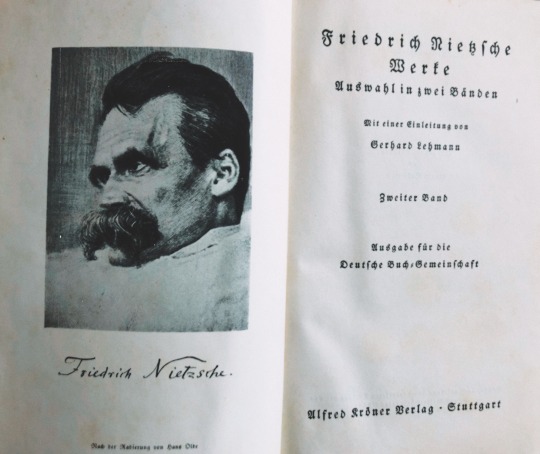

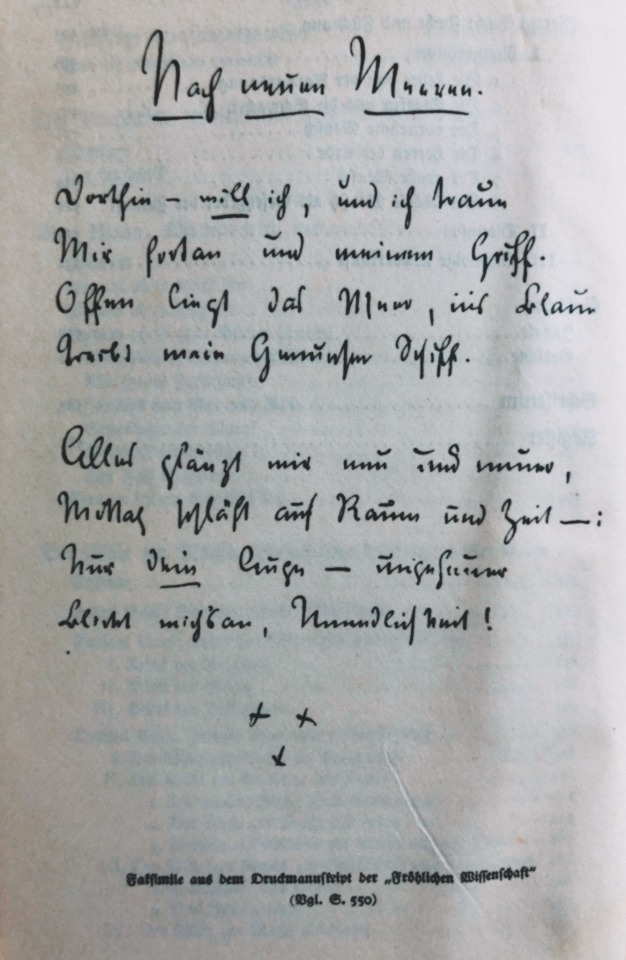
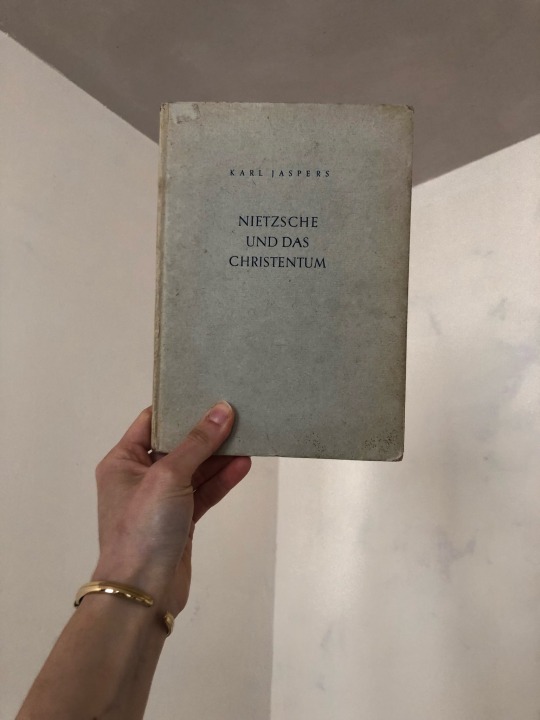
"Nietzsche and his Christian Worldview“ is presented by Karl Jaspers in 1938 (a lecture in the context of Wissenschaftlicher Predigerverein Hannover), who was pen pal of Hannah Arendt and mental Student of Max Weber. The other book is a collection of selected writings of Nietzsche, also published in 1938. Both not of antiquarian value, but can be used as credentials to underdraw the failure of all promises of salvation.
'In truth,there was only one Christian and he died on the cross.'
Every try to draw near to Nietzsche‘s philosophy and opinion, will stay insufficient. For understanding Nietzsche it is obligatory to understand his contradiction, to understand the discrepancy as a pretence-function. The 'completeness' of his philosophical claim, can just be expressed in this way of antinomy: Between drastic apodictic claims and endless dialectic of all abolishing possibilities.

Nietzsche also saws his current epoch in a crisis. The sinking of culture The replacement of education by merely knowing about education The permanent search for ways to compensate the mental loss of substance („seelischer Substanzverlust“) Universal acting and Living in the 'as if' (das Leben im „als ob“) The anaestesia of boredom by rush and sensation […] and in the noise of mind-simulation, everything is talking, all is ignored and missed by non-existent listeners, all is 'over discussed' to the point of losing importance and significance. And in the dullness of breathless acquisition, in the clamour of the masses, which are feeding the machinery that will in the end consume them, nobody is noticing the big event:
God is dead.
This phrase was too often miscontrusted as godlessness, it has to be seen more as an ontological perception of human existence in so called modern world.
Why is God dead? Should be the next question and Nietzsche would answer:
Because of Christianity.
In Nietzsche’s world-view, the interaction of Christian values and methods to 'overcome' the lies and hypocrisy are not to underestimate.
As Nietzsche himself had both parents descend from pastor families, he explains the distance from Christian Religion, especially the inner scepticism of German protestants, by the fact that they have lost their believe as they noticed the errors of what was preached and what was put into practrice.
But Nietzsche’s hostility is not holistically integrated into his basic experience, as he is using Christian value system for his theory of world-history:
The Universality, Unity, Coherence, Will for Truth (as a Symbol between Logos and Alogon, here the antinomy again) and the Christian Propulsion as the energy for break with all the falseness, because the deeply relfected thinker reveals this fanatism of rigid adherence on a world-immance of the One, that does not exist.
The reflected person, educates himself and is willingly disturbing the sure thought being.
With his restless thoughts, that will not give him comfort in determination, because the human will percieve a higher essence of being in „Nicht-Festgestelltheit“ (~ Not-Determinedness)
The Human will be alone, but he will reach new highs without a goddess, all beauty and all knowledge will be brought back to him, to us (auf-uns-Selbst-zurückrufen), he himself will be brought back into himself.
Out of the deepness of historicity of humanity, there will be fullfilled freedoms, because he will be the present, brought back into himself (sich-Selbst-geschenkt-werden).
Not only for Nietzsche is the distortion of Christianity, the reverse of what was true for Jesus.
It is generally underrated how Nietzsche is drawing an Image of Jesus, to exhibit defects of what the Christian Religion did with the ethical rules of behaviour Jesus exemplified.
„Im Grunde hab es nur einen Christen und der starb am Kreuz.“
Whereas Jesus embodied the ressentiment (of all Humiliated and Insulted, the resentement of the Powerless, the decandence of those, who will ruin themselves „Sich-Selbst-zu-Grunde-richten“),
the later Interpretation reduced the Symbol of a new humanistic ethic into faith.
Faith turned into doctrine and the symbol 'anouncement of the infinite bliss' was decreased into „lauter Sachen und Personen, statt der Symbole, lauter Riten und Dogmen, statt einer Praxis des Lebens.“
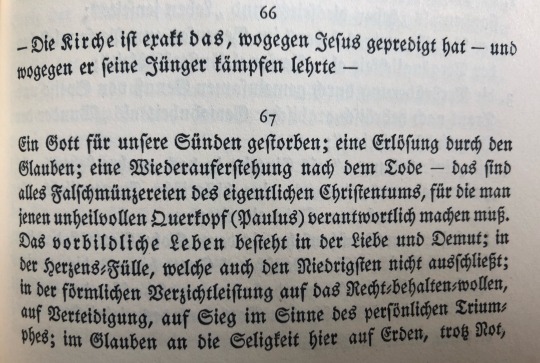
With Paulus impact Jesus was turned to the figure of the saviour, in the foreground the crucifixion and resurrection of Christ. And because the disciples of Jesus searched for an Explanation, because earthly Born can not bear the bottomless and the inexplicable, they searched for ways for atoning the crime, a method for expiating the sin, so they asked how could have this [injustice] happen?
It has to happen this way, God gave his son as a sacrifice for our sins.
„Nichts ist unchristlicher als die kirchlichen Kruditäten von der Gott als Person, von einem Reich Gottes, welcher kommt von einem Himmelsreich, jenseits, von einem ‚Sohn Gottes‘, der zweiten Person der Trinität … Das ist alles im welthistorischen Zynismus die Verhöhnung des Symbols.“
Nietzsche situates the destructive lie in Christianity, that made the Ancient Greek wisdom in vain, destroyed the Imperium Romanum, annihilated the progess of Islam scholarship and wisdom, the progress and humanistic ideas of the Renaissance and is till today blurring the striving of the individual to forefeel the truth, because the Christian demand on historical Totalwissen is paralyzing by tracing the Golden Age back to a long past time (ironically Nietzsche also, as he is proclaiming the historical highlight of humanity in pre-Socratic Greece, the up-lifting era of tragedy).
Nietzsche wants to establish a new philosophy, a countermovement, the nihilism for washing the humanity pure from all the attached and purported sins and fictions. Following the esperance to give the human an higher self by finding himself, without searching for himself, by drawing near to truth, without fixing and degenerating it. And Nietzsche is detecting, like other Übergangsmenschen, that science will also be instrumentalised and its content filled like previous dogmatic doctrines.

Now a personal train of thoughts: It gives me a feeling of unease, when ´Modern world´ is praised and labelled with concepts, which lack more and more authorization in the practice.
When neo-liberal economy, military re-armament, increased importance of biopolitics, parliamentary reduction of jurisdiction, hypersensitization of (mental) diseases […] are considered as absolutely necessary for maintenance of democratic governmental system, a more or less reflecting human-being is seeking for a debate culture, a professional (and thereofore unbiased) exchange of interdisciplinary methods of analysis.
It will remain difficult to establish a criticial discourse, even till today propagandistic instruments are used for formation of opinion, not just in countries like China, Russia or Turkey, but also in countries we would consider as intented to ensure freedom of speech, as economic interests are dictating the course and purposely replacing fundamental ethical principles (war and aggression are always to condemn, every armed conflict is a sign of humaneness failure !!! )
The world of our humanity is still not able to find sustainable solutions for the majour issues (Global Climate Crisis; rising gap between rich and poor; imprudent consumerism; Extensive Surveillance & Big Data, just to name a few...) of our future.
It can be considered as a sad disaster, that no philosophy, no religion, no ideology, lead to a peaceful and healthy world.
It could be so easy, if basic maxims, would have born in fruit. If the `Golden Rule´, which can be traced back till Ancient Egypt and India, would have been truely assimilated into soul and heart.
`Thou shalt not kill‘, but still today, mothers lose their children and women become willows.
O- we have wonderful definitions of peace and harmony, we were endowed by evolution with this present called reason, to order and tame the forces of nature, to make our lives more and more comfortable.
Equal we are born, but the place of birth is separating us, no equal chances and opportunities to actively improve our way of living, pushing the envelope with sincere effort to the limit of our mental and physical flexibility.
Indisputable are also the systematical limitations, in the modern world, science will be exploited for politcal and economic concerns. In a world, where 'God is Dead' , the seeking human can not find rest bottomless and abysmal, as long as he is not able to find home within himself.
It seems that science will constantly shoulder more and more responsibility and this development could improve prudent valuation and therefore a healthy basis for all live on earth.
But as science is the daughter of Philosophy, it must be reviewed and verified by Ethics Council (my Suggestion: Compiled by financial-independent international supervisory authorities of all areas of life and different vocational sectors, crossing all cultural and age-group section). It will stay a dream, to imagine a world without wars and greed, but if every single one could end the war within himself, I think there would be no war outside the own body and mind.

'Error is something rare in individuals, but it is the rule in groups, parties, peoples, times.'
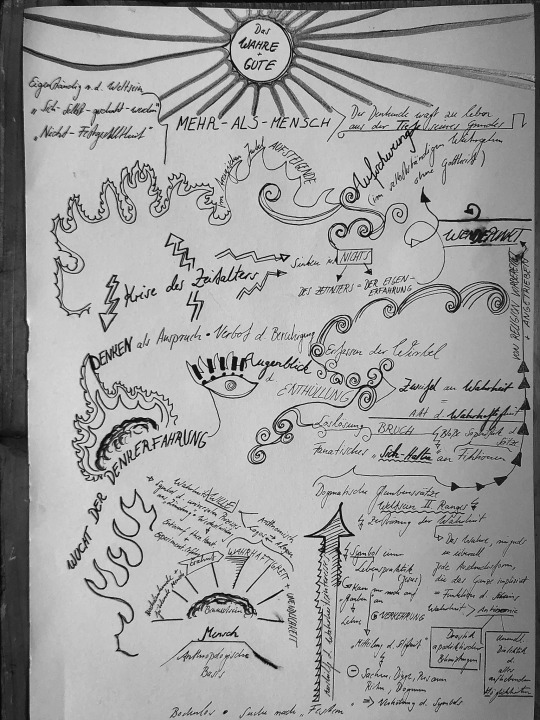
[Trying to fix a conception of how an individual can improve himself. No Completeness, very messy, here and there some teardrop disturbing the scripture !!! :') Never meet my own requirements :( ]
#Nietzsche#Friedrich Nietzsche#Zarathustra’s Monkey 🐒🥰#philosophy#thoughts#Menschwerdung#criticism against church#criticism against institutionalised religion#society critics#literature#book cover#bookworm#book#philosophical works#German philosopher#philologic#God is Dead#theodicy#Karl Jaspers#Hannah Arendt#Kritik
10 notes
·
View notes
Note
hey what are your thoughs about hmm scolippi JJBA that guy from part five. oh and diavolo bento aureo. uh huh wait since you asked for asks about women and wifes wow what if scolippi part 5 and diavolo golden wind were women and they-

GIRL COME ON

I'M TRYING TO MAKE A POINT HERE AND YOU'RE ONLY MAKING IT WORSE!!
Okay no but seriously.
Scolippi. Scolippi. Scoliosis, even.
He's such a beautiful yet tragic character, and he ties into JJBA's themes of fate and fighting against it so wonderfully. Even on his own, he's great.
He's a simple man, living in an unfair world full of power craving lunatics and egoists that were granted unimaginable power, while he is stuck with a curse that forces him into the position of being many people's guide to the afterlife ever since he was a child.
Yet, despite being put at a disadvantage from the start, he still does his best to be kind and to not harm others around him, using his ability solely for helping vulnerable people find peace - and to grant them the opportunity to defy Fate through choosing to go on their own terms.
Even after being beaten up, shot twice and held at gunpoint, he still offered his kindness to the two people that were actively antagonizing him at that moment. Even while he lied on the ground bleeding, he still prayed for their well-being and for their misery to not be pointless.
He's all things considered, a Saint.
I also like how his arc is a direct tie to the main antagonist of part 6 - Pucci.
They both had girls who were important to them, who both took their life due to circumstances they had little to no control over and they both seek peace above all else. Peace with what is to come.
While Pucci forces that peace, coupled with the burden of knowledge upon everyone in the whole universe, Scolippi simply offers a choice over their own life against cruel circumstances.
Pucci is also a priest, while Scolippi has elements alluding to Jesus all over him - which makes me think of the difference between institutionalised religion and the actual fundaments of said faith removed from a power hierarchy and alike of the Church.
Wherever Scolippi was after Part 5, I hope life turned out well for him.
Unless we go with the assumption that he was related to...
A certain other, purple haired and green eyed man with a Stand whose ability just so happens to directly mirror his own.

In that case, Scolippi just took L after L, it seems.
As for the OTHER GUY
I FUCKING HATE HIM!!! I HATE HIM SO FUCKING MUCH HE RUINED MY FUCKING LIFE!!!!
GETTING INVESTED IN HIM AS A CHARACTER COMPLETELY CHANGED ME AS A PERSON AND I WILL NEVER BE ABLE TO UNDO THAT NO MATTER HOW MUCH TIME PASSES!!!!!
I HATE THAT THROUGH THIS PINK RACCOON LOOKING THING I MET YOU - THE BEST THING THAT EVER HAPPENED TO ME, AS WELL AS OUR OTHER FRIENDS WHO I CHERISH JUST AS MUCH TOO!!
I HATE THAT I OWE SO MUCH OF THE CURRENT HAPPINESS IN MY LIFE TO THIS FICTIONAL MAN WHO CAN'T EVEN BE BOTHERED TO PUT ON A REAL SHIRT FOR HIS DEBUT!!!
I HATE THAT MEETING HIM FUNDAMENTALLY CHANGED ME AS AN ARTIST AND CREATOR AND THAT I WILL NEVER BE ABLE TO RETURN TO BLISSFUL IGNORANCE THAT COMES WITH MEDIA ILLITERACY!!!! I WILL FOREVER BE CRITICAL OF ANYTHING I CONSUME BECAUSE OF HIM!!!
AND IT'S ALL YOUR FUCKING FAULT TOO!!!! I WASN'T EVEN THAT INVESTED IN HIM UNTIL YOU CAME ALONG AND PUT A BUNCH OF PINK , GREEN DOTTED WORMS IN MY BRAIN!!!! I HATE YOU TOO!!!!!! GOD!!!!!!!
but omg what if he and scolippi were in fact women.
Hm.
idk I don't think we'd get some huge AU out of it with them as the main cast
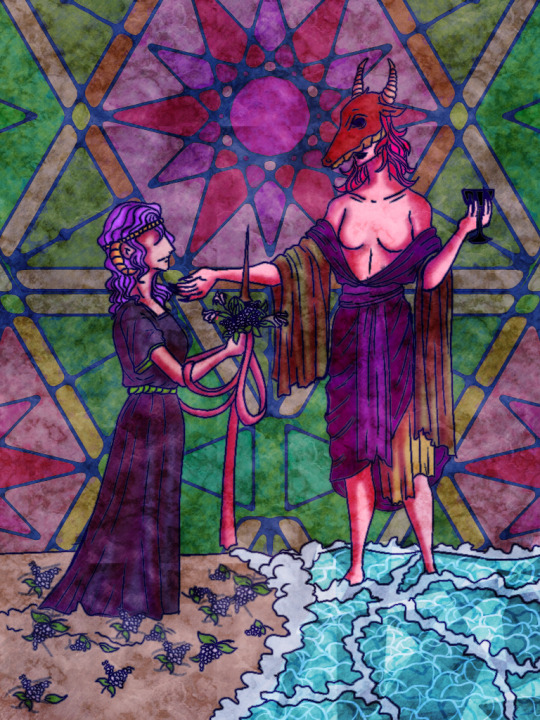

where the two of them are in love and silly and married




and where they have a cute bunny baby


yeah no that definitely wouldn't happen. never.
why do you ask.
#girl im gonna so fucking kill you after this.#jjba#jojo's bizzare adventure#vento aureo#jjba diavolo#scolippi#or rather#serena melone#it's a dumb name i know#serdia#babbi#rhine questions#rhineart#jojo au
21 notes
·
View notes
Text

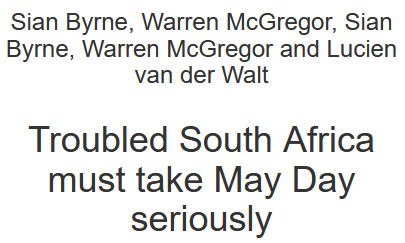
This is a time to embrace working-class unity and challenge the status quo of capitalist oppression.
May Day – a call to build an international movement of working class and poor people across lines of race, nation and religion for workers’ control and democracy from below, social justice and freedom from political and economic oppression – remains critical. In a country racked by anti-immigrant violence, racial and ethnic tensions, the fragmentation of the labour federation Cosatu, corporate scandals and political corruption, it is time to remember May Day’s roots and aspirations.
The day has become an institutionalised festival, yet its origins lie in powerful struggles for a united, anticapitalist, bottom-up, global justice movement, affirming the common interests of people, worldwide, against ruling elites and their divide-and-rule policies.
With the 2015 May Day set to be a showdown between South Africa’s rival union blocs, it is time to remember its roots and aims. Working-class unity is the only way to overcome problems such as class inequalities and national oppression in South Africa, a country ruled by the 1% and racked by periodic anti-immigrant violence.
Posing the problem as psychological – as in Police Minister Nathi Nhleko’s claim that recent violence is “Afrophobia” driven by “self-hate” – ignores attacks on Asian foreigners and assumes a natural state of African unity. It completely ignores the role of class and capitalist systems in which divisions between rich and poor, powerful and powerless, exist within races and nations. A Zimbabwean worker, a Pakistani worker and a South African worker have more in common with each other than any of them has with the Zimbabwean, Pakistani and South African upper class.
Ruling classes pit people against one another by means of economic policies that entrench historic inequalities, political mobilisation on the basis of race and nation by parties, states, ideologues and propaganda. Suburbs that are home to the black and white middle and upper classes sleep peacefully, far from the chaos and misery that arise from these policies, whereas the working class and poor turn on each other.
South Africa’s incomplete transition out of apartheid has left deep racial inequalities and national divisions. The legacy of apartheid and segregation is visible everywhere: the black, coloured and Indian working class and poor are doubly oppressed, by race and by class; the main political parties provide no solutions, but are part of the problem.
Radical changes are needed. Those proposed by the Federation of South African Trade Unions (Fosatu) and, before it, the International Socialist League (ISL), Industrial Workers of Africa and the International Working People’s Association (IWPA) include placing power, including self-managed control of the economy, into the hands of a multiracial working class and poor majority, rather than in parliaments or corporate boardrooms.
Changing statues will not address the issues. Indeed, political mobilisation of this sort, delinked from a radical programme of working-class rule, will simply reinforce the myriad divisions – immigrant versus national, race versus race, country versus country – that are the key to the power of the 1%.
Radical changes require a dynamic labour movement with a radical project, allied to other popular sectors altogether outside the party system and the electoral arena. These positions lie at the radical roots of May Day, which began as a commemoration of and protest against the 1887 execution of four IWPA anarcho-syndicalist labour organisers from Chicago.
One of them, August Spies, declared from the scaffold: “If you think that by hanging us, you can stamp out the labour movement – the movement from which the downtrodden millions, the millions who toil and live in want and misery – the wage slaves – expect salvation – if this is your opinion, then hang us! Here you will tread upon a spark, but there and there and behind you and in front of you and everywhere, flames will blaze up. It is a subterranean fire. You cannot put it out.”
Spies stressed popular self-emancipation: nonracial mass organisations to fight the state, capitalism and all forms of oppression and to establish a participatory, self-managed, democratic socialism, without state or corporate rule. This “Chicago idea” became part of the anarchist movement, especially in the Global South.
All states, all parties, were seen as betrayers of the working class, elections as futile choices between lying politicians – an insight many South Africans now accept. Even a workers’ party could not escape the logic of incorporation into a state machinery serving political and economic elites.
The IWPA practiced what it preached. IWPA militants such as the former slave Lucy Parsons, immigrants such as Spies and Samuel Fielden, and Americans such as Oscar Neebe and Albert Parsons led the main unions and working-class associations of Chicago, published radical newspapers and organised armed self-defence units. The IWPA took a leading role in a titanic 1886 general strike by black and white, immigrant and foreigner, centred on Chicago, and hence the organisation was targeted for repression. Eight IWPA militants were charged and four hanged.
In commemoration, the Socialist International, formed by anarchists, Marxists and others in 1889, launched May Day as a global day of action – in effect, it was to be a global general strike to build global labour unity.
May Day in South Africa started in the 1890s, among immigrant European workers. Early Witwatersrand events were whites-only affairs, ignoring the reality that the state felt no particular loyalty to white workers: more than 20 were shot down in the 1913 general strike, and martial law was used to suppress workers’ uprisings in 1914 and 1922.
An alternative May Day tradition emerged in 1904 from Cape Town, where local unions and the anarchist-led Social Democratic Federation (SDF) brought coloured and white workers together. The syndicalist ISL, formed in 1915, and Industrial Workers of Africa, formed in 1917, resolved to organise black workers, fight pass laws and secure complete equality through “one big union” fighting against segregation, capitalism and the state: the “Chicago idea” on the Highveld.
In 1917, the ISL organised a joint May Day rally in Johannesburg with the Transvaal Native Congress – the first local May Day with African speakers, including the ANC’s secretary general of the time, Horatio Mbelle. The Communist Party of South Africa, as it was then, continued the SDF-ISL tradition of May Day with a series of nonracial rallies to oppose race and class oppression. In 1922, the communist party demanded May Day become a paid public holiday, a demand taken up by the syndicalist-influenced black and coloured Industrial and Commercial Workers Union of Africa.
Massive May Days were held from the 1920s onwards, but the tradition withered under apartheid repression. May Day was revived by the South African Congress of Trade Unions in the 1950s and by the new unions of the 1970s. By the mid-1980s, May Day was again a day of mass action, as pushed by Fosatu and then Cosatu.
But, if the tragic origins of May Day are still commemorated today, its grander aspirations remain unfulfilled. The enormous power of a united working class remains shackled.
Labour-led organisations achieved surprising victories in difficult and divided contexts. These movements provide a resource base for ideas and strategies. By specifically organising among immigrants and by focusing on issues that disproportionately affected some groups of workers (racial oppression, for example), they built working-class counter-power, counterculture and solidarity.
This is a far cry from the situation today. The Cosatu labour movement has not succeeded in addressing its internal divisions. Indeed, its alliance with the ANC and the South African Communist Party has led to numerous splits, from the attack on figures opposed to President Jacob Zuma, such as then-president Willie Madisha, by Zwelinzima Vavi in 2007, to the expulsion of the National Union of Metalworkers of South Africa (Numsa) from Cosatu on the flimsiest grounds.
Within South Africa’s borders, ANC-driven neoliberal policies such as the Growth, Employment and Redistribution strategy and the National Development Plan have deepened poverty and inequality, creating a breeding ground for tensions on all sides. Regionally, South Africa is an imperialist power, deploying its superior economic power and military and political muscle across the continent, alongside the expansion of private and state-owned corporations in Africa.
South African military actions in the Central African Republic and the Democratic Republic of Congo from 2013 onwards are protecting ANC-linked businesses. South African silence on corrupt candidates in fraudulent elections (the DRC in 2001, Nigeria in 2007, Zimbabwe in 2011) is governed by crude ruling-class interests.
This cannot be separated from South African contempt for fellow Africans and attitudes to the rest of Africa.
Numsa’s return to a radical project, with some roots in Fosatu, its break with the tripartite alliance and its formation of a United Front revives the original spirit of the movements and struggles that made May Day. Let us hope Numsa carries forward the radical spirit of May Day by way of bottom-up, participatory trade unions at a distance from Parliament, capitalism and the state. May Day needs to be linked back to its radical roots, its one-time internationalism and the vision of an inclusive socialism from below.
#May Day#South Africa#labor#South African politics#anarchism#resistance#autonomy#revolution#community building#practical anarchism#anarchist society#practical#anarchy#daily posts#communism#anti capitalist#anti capitalism#late stage capitalism#organization#grassroots#grass roots#anarchists#libraries#leftism#social issues#economics#anarchy works#environmentalism#environment#anti colonialism
1 note
·
View note
Quote
It was in the attempt to form a new type of individual that the bourgeoisie engaged in that battle against the body that has become its historic mark. According to Max Weber, the reform of the body is at the core of the bourgeois ethic because capitalism makes acquisition 'the ultimate purpose of life', instead of treating it as a means for the satisfaction of our needs; thus, it requires that we forfeit all spontaneous enjoyment of life (Weber 1958: 53). Capitalism also attempts to overcome our 'natural state', by breaking the barriers of nature and by lengthening the working day beyond the limits set by the sun, the seasonal cycles, and the body itself, as constituted in pre-industrial society.
Federici S (2017) Caliban And The Witch: Women, the Body and Primitive Accumulation. New York, NY: Autonomedia. p135
This quote from Federici, similar to Barnwell’s article Durkheim as affect theorist, is a good reminder that the tendency to speak of the sociology of the body and emotions as turning focus to what was historically neglected by sociology misleadingly gives the impression the Cartesian dualism was universally shared rather than arising from the way sociology was institutionalised as a discipline. Weber with his writings on ‘rationality’ has often been accused of Cartesianism. Yet as Turner (2008: 59) notes whilst “Weber’s sociology of religion is conventionally approached in terms of a contradiction between meaning and knowledge [’the disenchantment of the world’], there is a major component of Weber’s analysis of religions as various systematizations of irrational salvational paths where the opposition between body and meaning becomes critically important”.
It’s not that Weber accepts the mind-body division as metaphysically fixed, but instead sees this division as a product of socio-historical developments. As Turner puts it, also nicely highlighting similarities between Weber and Foucault -
In mediaeval times, the attempt to create a rational and systematic regimen of denial was largely confined to the religious orders who, as it were, practised asceticism on behalf of the lay man. Expressing this differentiation in spatial terms, reason was allocated to the internal domain of the monastery, while desire ran rampant in the profane world of the lay society. In this respect, we could perceive the principal argument of Weber’s The Protestant Ethic and the Spirit of Capitalism (1930) as an account of how the Reformation took the ascetic denial of desire out of the monastic cell into the secular family. Protestantism thus sought to break the distinction between the elite and the mass by transforming elite practices into everyday routines of self-control. Abstinence, the control of passions, fasting and regularity were thus held up as ideal norms for the whole society, since salvation could no longer be achieved vicariously by the labours of monks. The disciplines and regulations of the family, school and factory thus have their historical roots in the redistribution of monastic practices within the wider society. The monastic cell was installed in the prison and the workshop, while ascetic practices spread ever outwards (Foucault, 1979: 238).
- Turner BS (2008) The Body and Society, Third Edition: Explorations in Social Theory. 3rd edition. Los Angeles: SAGE Publications Ltd. p.22
14 notes
·
View notes
Text
Witchcraft - The FAQ
So, you are interested in witchcraft but you have a lot of questions: This post is going to address some of them. This is by no means an exhaustive list. (This post does not contain any practical information for spells.)
Who can become a witch?
Everyone, regardless of gender, faith or heritage, can become a witch, if they are willing to learn.
How do I become a witch?
By studying and practicing witchcraft!
What can witchcraft do?
Witchcraft cannot bend the laws of physic (sorry, no flying on broomsticks), but it can help you achieve your goals. However, it cannot substitute mundane actions (if you need a job, for example, you still need to apply for jobs). It can open doors and help you along. For many witches, witchcraft increased their well-being because witchcraft fulfils a spiritual need and because it gives you some control over your life.
Do I need a teacher/mentor?
No. Nowadays, most witches start on their own. There is nothing bad about this. It helps you explore different paths and developing your own style. A teacher can help you refine your skills once you have learned the basics. This should be a person you can trust. Be cautious and stay safe.
Do I need a coven/witches’ circle?
No. Again, there are many solitary practitioners. And that is okay! Witches are not organised institutionalised globally, like the Catholic church, for example. It can be really hard to find witches in your area. Group rituals can be amazing, but you have to really be able to work well with these people.
Are all witches Satanists?
No. Some are. The way that Satanism is often portrayed by the media, however, is not necessarily accurate. (Related: Do witches sacrifice people/or animals? Generally not. Nowadays, most sacrifices are symbolic. Another popular offering is food.)
Is witchcraft a religion?
Witchcraft is not a religion, but a practice. Many witches incorporate their faith into their witchcraft. There are witches of nearly any faith and there are witches who are atheists. (There is also a long-standing tradition of Christian witchcraft.) Sometimes the term “witchcraft” is falsely used synonymously with Wicca. Wicca is a neo-pagan nature-religion founded in the 1950s that incorporates witchcraft in their rituals.
Is witchcraft dangerous?
Witchcraft is only dangerous if you are scared, or if you do not protect yourself appropriately (for example through a circle, cleansing and grounding). In that case it can be overwhelming. Also make sure that you know any potential health risks of the materials you are working with (this goes especially for essential oils, herbs and crystals).
Are there universal rules all witches need to follow?
No. You might come across the “Wiccan Rede” and the “Rule of Three”. These are moral codes/beliefs that are shared by some Wiccans, but not all witches.
How do I know which type of witch I am?
You might have heard about different types of witches on tumblr. Cottage witches, hedge witches, sea witches, etc. You don’t have to concern yourself with labels when starting out. After a while you will probably find that some aspects of witchcraft are more interesting to you than others.
Where do I start?
Do research! Read up on different paths of witchcraft and learn the basics. How to do rituals, how to work spells, what you need for spells, etc. Read a lot! Read different authors and gather different perspectives! Find out what makes sense to you and what you feel comfortable with!
Are there any books you should read?
There is no Holy Script for witchcraft. Each witch has their favourite authors. Generally, it is important to read critically. Most books on witchcraft have at least one of the following flaws:
They present the authors beliefs/practices as universal.
They equate witchcraft with Wicca.
They give in-accurate accounts of history in general and especially about the persecution of witches in the past, as well as the origins of modern witchcraft practices.
They try to legitimate witchcraft with superficial/or wrong science.
They are sexist, homophobic and/or transphobic. Most books simply do not acknowledge the existence of gay, bi or trans people at all. (This does NOT mean that witches cannot be gay, bi or trans.)
They appropriate practices/beliefs from closed cultures or religions.
If you keep this in mind, however, you might still find good information in these texts. Read with a pinch of salt and decide for yourself which authors are worth your while. It is always a good idea to check any information about history, science and health against non-esoteric sources. Tumblr is, in my opinion, a good resource for spells and the basics, but books often offer a deeper insight into the workings of magic.
Do I need a Book of Shadows/a Grimoire?
Book of Shadows or Grimoires are a witch’s personal spell book. Not all witches have one, but it is useful to take notes somewhere. This way you can keep track of your progress and you don’t have to remember everything. It is totally valid to look up things, even as a more experienced witch. A paper notebook or a Word document will suffice. A digital Book of Shadows is useful because it is easy to add things and keep it structured at the same time. Just keep in mind that it is a tool for you and doesn’t have to look fancy or be ready for publishing.
When and how do I start practicing?
This is up to you. Once you learned about the basics, you can start with simple spells. There are a great many master posts with spells for beginner witches on tumblr. Many of them can be incorporated into everyday life.
Tumblr witch etiquette:
Most witches on tumblr are happy to answer beginner witches’ questions. Please do your own research before doing so, however. Popular blogs get a lot of questions a day. Behind those blogs are human beings. Please treat them as such and not as answer-machines. Many blogs have FAQ pages or tags filled with resources for beginner witches. Many questions can also be answered through a quick Google search.
A note to underage witches:
Please stay safe. Never share personal information with a stranger. I would also advice you not to reach out to witches in real life/your area until you are older. Witchcraft does attract some weird folk. Most covens will not accept members under 18, anyway. If you are under 18, use this time as a solitary practitioner to get to know yourself and your craft better!
Feel free to add onto this list!
635 notes
·
View notes
Link
Christianity in the Second Century shows how academic study on this critical period of Christian development has undergone substantial change over the last thirty years. The second century is often considered to be a time during which the Christian church moved relentlessly towards forms of institutionalisation and consolidated itself against so-called heretics. However, new perspectives have been brought within recent scholarship as the period has attracted interest from a variety of disciplines, including not only early Christian studies but also ancient Judaism and the wider world of the early imperial scholarship. This book seeks to reflect this changed scholarly landscape, and with contributions from key figures in these recent re-evaluations, it aims to enrich and stimulate further discussion.
1 note
·
View note
Text
Writing Oppression
(Want more? Check out my Writing tag!)
Hope you’re not sick of the Stormblood-induced rants yet, because here’s another one.
I’m sure there’s many Domans, Xaela, and Ala Mhigans getting ready to get back at those darn Garleans and settle into their newly liberated homes. So I’m sure a lot of the player stories that come out of Stormblood will be surrounding that: themes of oppression, of returning home with new experiences, the idea of institutionalised power and how it can be wielded, and so on.
Well, maybe, anyway.
To preface this, my demographic is not what you might call “disenfranchised”. None of the places I’ve lived in or visited are particularly rife with genuine oppression--which I suspect will change when my North Korean visa finally gets approved and America hits its third year of a Cheeto Benito presidency (ooh, spicy political commentary!)--so I’ll admit that I’m approaching this topic more in theory and from logical examination than from experience.
I’ve definitely consumed media wherein oppression is depicted however, and more often than not such things end up depicted more cartoonishly than anything else. You know, really weird and unintuitive racial slurs, mustache-twirling commissars, goose stepping secret police, and so on.
I’d like to avoid that. Oppression in fiction can be a fascinating topic and an environment that provides for a lot of intrigue.
And if you’re worried that this post is going to contain some ol’ SJW bullshit then, well, it’s not.
So if you’re looking to approach the topic of Garlemald’s occupation in your storyline, you may want to read further.
1). Internalisation is a genuine factor to consider.
In short, when you get told something often enough, you’ll probably start believing it regardless of whether or not you cognitively recognise it as false.
For a historical example, a “colonial mentality” is a form of internalised oppression where the colonised people feel themselves to be inferior to their imperialist colonisers. The nuances are complex--thoughts can range from “Well they managed to take over half the world and we didn’t so we must be worse people” or “our economy is so much better now with our new overlords”, and so on--but the principle is relatively simple. This sort of thing happened a lot with the spread of the Spanish Empire and the rule of the conquistadors, particularly with places like the Philippines.
It happens a lot in marketing too: women are told they’re not thin and beautiful enough, men are told they’re not manly and successful enough, and both of these things lead to self-esteem issues. Same mechanism, for the most part.
Weirdly enough, this is something I almost never see portrayed in fiction with oppressed societies. It’s a kind of society-level Stockholm Syndrome. Certainly there will be Domans or Ala Mhigans or Xaela who truly believe that they are inferior to Garleans and that Garlemald is something to aspire to, and breaking such an internalisation takes a lot of work, simply because the information is everywhere.
So when you’re considering why oppressed citizenry might side with their oppressors, consider internalisation. Consider the effect of seeing and hearing “Be grateful to your conquerors for they are better and wiser” day in, day out.
2). Bigotry and intelligence are not mutually exclusive.
Or to put it another way: people can genuinely believe racist shit regardless of their status, upbringing, or intellect.
Let’s write a character, Garlic McGarlemald the Garlean. For all intents and purposes he is kind, fair, and intelligent. He’s a university professor, donates to the poor, loves his wife and children, and also sincerely believes that all Xaela are savage horsefuckers who cut off their enemy’s heads in order to consume their soul.
Wait, what?
One of the pitfalls of writing an oppressive or racist society is the depiction. A lot of these stories depict all oppressive racists as universally dumb, drooling ignoramuses who spend all day teaching their children to play “Lynch the Minority” and “Spell the Slur”. And, well, okay, there are certainly people like that.
But in a truly oppressive society, the dumb racists are not the dangerous ones: the really dangerous ones are people like Garlic McGarlemald who is, for the most part, an ordinary person perfectly capable of critical thinking, yet still inexplicably believes in this shit for reasons no party can really rationalise.
And if that doesn’t seem logical in the slightest, it’s not. But it’s certainly realistic.
People do actually believe in stuff like that. You had scientists in the 19th century seeking “natural, evolutionary” reasons as to why other races were inferior to whites. You had logicians, biologists, and anthropologists huddling around and wondering why whites were so much awesome-er than all those other dirtfarmer races. It was something that was just believed. Maybe it was because it was a cultural cornerstone or it was merely a result of internalisation, but people who by all rights could be considered intelligent and capable believed that stuff.
And while we’re on the subject...
“But my bigot character doesn’t really believe in that stuff, of course he’s smart enough to know that’s all bollocks,” you might say. Garlic McGarlemald is just under social pressure to pretend he believes this stuff, that’s all!
Well, that’s not really valid. For one, from a writing perspective, that kind of argument is a total cop-out; it’s a lazy way to keep your character “clean” for fear of being controversial. For two, lip service has absolutely zero value in this context: unless Garlic McGarlemald is actually willing to take action, he’s still a bigot. A passive and well-meaning bigot, perhaps, but still a bigot. Not only is he a bigot, but he is a hypocrite too, because he refuses to jeopardise the racist and bigoted system that he himself benefits from.
And this is where the “with us or against us” mentality sort of comes from: if your character is part of the oppressors, then he/she is an oppressor unless they’re actively working against it. Being passively racist is still racist, so sayeth the oppressed, because institutionalised power is still power.
3). Prejudice can have layers.
Consider the “double jeopardy hypothesis” which proposes that, for example, a Asian-American woman is not only subject to racism and sexism, but to the combined effects of both simultaneously. And if she falls into the LBTQ camp (or however many letters that camp seems to have these days), then she’s going through triple jeopardy because heterosexism piles on like a big smelly heterosexist frog.
I say that it’s a hypothesis (and from a scientific standpoint it still is) but this isn’t particularly beyond the stretch of logic.
Let’s say your Xaela meets Garlic McGarlemald. Now obviously, Garlic McGarlemald hates your Xaela. But he doesn’t hate your Xaela just because your Xaela is a Xaela: Mr. Garlic hates your Xaela because they talk funny, dress in rags, have a weird pagan religion and because they’re bisexual.
Would Garlic McGarlemald hate a Garlean who was the same thing? Well, we don’t know. But the point I’m trying to make here is that an oppressive society will use everything, and I mean everything it can weaponise against the people they’re trying to oppress.
To go further, Garleans might dislike that Domans speak a weird language, they also hate Domans because they eat raw fish (barbarians!), force their children to kneel on bamboo mats (monsters!), and refuse to export Mother 3 to the United States, in addition to taking eight years to finish a new Persona game (complete heathens, I say!).
See what I mean?
4). People who belong to the oppressor group can have nice qualities.
If you’ll harken back to my intro paragraph, I don’t like it when oppressors are depicted as universally revolting mustache-twirling Nazis with no redeeming qualities.
Like I said, Garlic McGarlemald can be considered a nice guy, excepting the racism. People who are among the oppressors in an oppressive society aren’t universally bad. After all, for a lot of them it’s not particularly their fault that they were raised in a society that encouraged such bigotry. And internalisation happens with things like racism too: even when they become educated, they seek new reasons to justify their bigotry because it’s all they were raised to know.
There is a nauseating amount of self-righteousness that comes with depicting all racists and bigots as unrepentant monsters who hit so many branches of the stupid tree that they’re in danger of accidentally swallowing their own extra chromosome.
So don’t do that. If you’re going to write your oppressors, at least write some of them as mostly well-meaning.
5). Avoid tokenism.
Or, to put it in a more wordy way: either judge every group within your story as a group, or judge every group within your story as individuals.
Let’s say that Garlic McGarlemald is actually not a nice man, and he drinks alcohol and beats his wife.
Edgy, isn’t it?
Now, when being written by a not-so-good writer, Garlic McGarlemald won’t place any stigma upon his group, because he is part of the oppressive Garleans. It’s not that all Garleans are drunken wifebeaters, it’s just that Garlic McGarlemald specifically has that problem.
Meanwhile, Xaela Xaelason accidentally trips and breaks a bottle, therefore all Xaela are clumsy!
No. That can’t fly. And the reason why that can’t fly is because it very quickly descends into becoming preachy.
This happens a lot with poorly written fantasy novels: there is a single named character who is gay or has dark skin, and that single character ends up representing the author’s entire views on gays or black people.
So when you’re writing something like an oppressive society, multiple characters are important. You have to be willing to do the work to portray each side--oppressors and the oppressed--as having complex people who aren’t easily categorised.
Don’t insert a Token Doman or a Token Good Garlean or a Token Evil Xaela and then use that character to make blanket statements within your story. Because that’s just lazy writing.
6). Oppression is hard to escape.
Whether you’re one of the oppressors attempting to open your worldview or you’re one of the oppressed trying not to fall down the same slippery slope, oppression isn’t an easy thing to “win” against.
There’s no magic argument or book that suddenly allows one to instantly widen their acceptance of race, religion, language, sex, sexual orientation, etc. Similarly, there is no Garden of Eden free of prejudice.
If you’re planning to tackle oppression as a theme, be prepared to be conscious of it, for as long as the theme is relevant. You can’t have Xaela Xaelason make it to the land of his people and decide that Prejudice Doesn’t Exist. No, Xaela Xaelason would be judged based on the fact that he was born in a city and doesn’t know any Xaela customs or traditions. He’d be judged for not staunchly supporting the tribal religion. He’s among other Xaela, and there will be prejudice there, too.
It’s a double-sided magnet, and it has some powerful pull. Be aware of that.
#ffxiv#final fantasy xiv#stormblood#rp#roleplaying#writing#writing tips#oppression#honestly the hardest part of these posts is coming up with damn tags#ala mhigo#i hope i don't regret writing this?
20 notes
·
View notes
Text
Opinion: Saudi Prince Mohammed's religious moderation unlikely to change Asian realities
Saudi Crown Prince Mohammed bin Salman may be seeking to revert his kingdom to an unspecified form of moderate Islam but erasing the impact of 40 years of global funding of ultra-conservative, intolerant strands of the faith is unlikely to be eradicated by decree.
Not only because ultra-conservatism has taken root in numerous Muslim countries and communities, but also because it has given opportunistic politicians a framework to pursue policies that appeal to bigoted and biased sentiments in bids to strengthen their grip on power. Nowhere is that more evident than in Asia, home to several of the Islamic world's most populous countries.
Examples of the fallout abound among recipients of Saudi largess. They include institutionalised discrimination in Pakistan against Ahmadis, a sect considered heretic by orthodox Muslims, as well as biased policies towards non-Muslims and Shiites in Pakistan, Malaysia and Indonesia.
Basic freedoms in Bangladesh are being officially and unofficially curtailed in various forms as a result of domestic struggles originally enabled by successful Saudi pressure to amend the country's constitution in 1975 to recognise Islam as its official religion. The amendment was a condition for Saudi recognition of the young republic and the promise of substantial financial support.
Reports that Prince Mohammed in a dramatic gesture to Shiites, who have been discriminated against for years in the kingdom and demonised by its religious and political leaders as part of Saudi Arabia’s public affairs war with Iran, plans to visit the Shiite religious citadel of Najaf in Iraq is likely to do little to change things on the ground in Muslim majority nations in Asia.
Neither will his meetings with Christian religious luminaries in Egypt and elsewhere even if they demonstrate that Saudi Arabia, the custodian of Islam’s two most holy cities, is, under Prince Mohammed’s guidance, embracing principles of inter-faith dialogue and religious tolerance.
Reporting on a visit to the ultra-conservative Indonesian region of Aceh, Islam scholar Kamaruzzaman Bustamam-Ahmad noted that "supporters for anti-Shi’ah in Aceh are Wahabism, an Islamic political party, a group of young Acehnese who finished their study in the Middle East....They play their role in urban areas. After the Tsunami (in 2004), many of pesantrens (religious seminaries) from Wahabism were built in Aceh. They received funding from 'outside' Aceh."
Bangladeshi journalist Ahmedur Rashid Chowdhury, who fled his country after a failed assassination attempt by religious militants, recently sketched Bangladesh's migration from a nation founded with aspirations of "economic, political and intellectual emancipation" to one in which the "will of the military and its leadership was key in shaping politics towards selfishness and subornation” and “political parties are willing to go to any length to hold on to power."
It was a process abetted by Saudi Arabia. Chowdhury noted that "the healthy trend of democratic and progressive politics was never able to regain a footing in Bangladesh" with freedom of speech and the press as one of its major casualties. Unlike human rights lawyer and writer Ikhtisad Ahmed, Chowdhury shied away from referring to the role of Saudi Arabia and Saudi-inspired ultra-conservatism in his country’s political development.
One strand of ultra-conservatism, Salafism, that Saudi interior minister Prince Nayef bin Abdul Aziz wanted to elevate to an official Islamic school of thought shortly before his death in 2012, gained, according to Ahmed, currency under the coalition government in the first years of the 21st century formed by the Bangladesh Nationalist Party and Jamaat-e-Islami, a controversial group that opposed the country's independence.
Like in Pakistan, of which Bangladesh was part until, 1971, the military as well as political parties maintained opportunistic ties to militants such as Jamaat-ul-Mujahideen and Harkat-ul-Jihad that were often as opposed to secularism as they were to Saudi-style monarchy.
As a result, Bangladesh, the world’s fourth largest Muslim nation, is at the heart of a struggle between liberalism and ultra-conservatism that questions Saudi Arabia's legacy and is about reforms that go beyond anything envisioned by Prince Mohammed. It is a battle in which free-thinking, journalists, writers and intellectuals have paid a heavy price.
In the latest incident earlier this month, prominent scholar, award-winning science fiction author and outspoken critic of religious militants, Muhammed Zafar Iqbal was stabbed and seriously injured in a knife attack in the north-eastern town of Sylhet.
Iqbal was the latest victim of more than 30 machete attacks, shootouts, and bombings in Bangladesh in the past three years, including last year's assault on the Holy Artisan Bakery in Dhaka in which 22 hostages were killed.
The country's battle was fuelled by a 2010 Bangladesh Supreme Court decision to roll back the Saudi-inspired amendment of the constitution and restore secularism as its basic tenant as well as the execution of Jamaat-e-Islami leaders for war crimes during the 1971 Pakistani-Indian war that gave birth to Bangladesh.
In response, ultra-conservatives and militants demanded death for "atheists and apostates" who had demonstrated in favour of the death penalties, stricter anti-blasphemy legislation and a crackdown on alleged un-Islamic cultural practices.
To be sure, Saudi Arabia, a country that is itself in transition, is unlikely to be backing the ultra-conservatives and militants. Yet, their struggle and deep-seated polarisation in Bangladesh are offshoots of the kingdom’s past ultra-conservative support and the creation of an environment in which politicians and state organs can opportunistically exploit religious sentiment.
Criticism of the government of Prime Minister Sheikh Hasina Wazed’s weak response to the violence, if not inaction, coupled with the battle for the soul of Bangladesh serves as evidence that reversing the fallout of four decades of Saudi promotion of ultra-conservatism as an anti-dote to Iranian revolutionary zeal will take time and often be volatile. The same is true for efforts to counter creeping ultra-conservatism in countries like Indonesia and Malaysia.
In fact, what the struggles in Bangladesh, Pakistan, Malaysia and Indonesia suggest is that today's culprits are not Saudi Arabia, even if it bears a responsibility, but politicians and/or national governments. Said Chowdhury: "The failure to bring culprits to justice in many of the recent attacks in Bangladesh has 'been the deliberate goal of the government. It supports their ambition to continue holding on to power by silencing critics and pandering to the religious right'."
(Disclaimer: The opinions expressed above are the personal views of the authors and do not reflect the views of ZMCL)
]]>
0 notes
Text

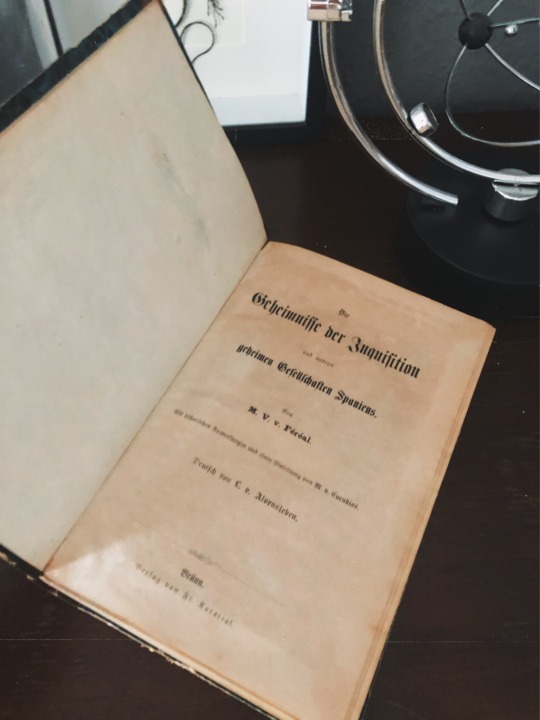
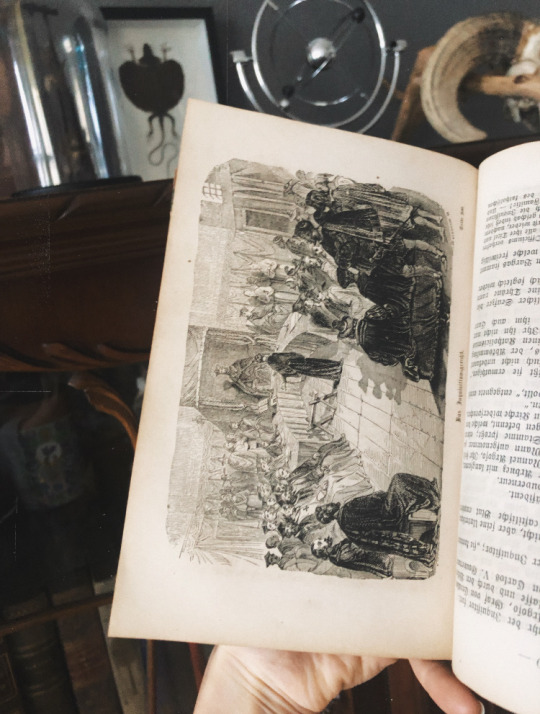

"The Secrets of Inquisition and Other Secret Societies in Spain" written by Victor de Féréal in 1845 (due to my researches, found out that behind this name is Madame de Suberwick) revised by M. de Cuendiaz and tranlated into German by L. von Alvensleben. The seamy shady side of history can sometimes be so dark and terrifying, that it could easily compete with every horror movie. The 16th century is not without cause, one of the darkest epochs.
“(…) if the one, who is ruling, would be a good shepherd, he would not allow greedy people to shear his sheeps, who would cut with the scissor down to the flesh, to get the wool together with the blood. The indulgence against the Inquisition is nothing more than political calculation. The love for gold is, what covers the empire with pyres.”
Sometimes acquiring a book and have no real clear expectations, it can fastly turn into astonishment. Do not know, why calculating with an historical non-fictional book, I've achieved an amazing fictional book, that is creativily integrating "The Secrets" and "Underworld Jargon" into a romantic frame-story:
Sevilla in 1534 under King Charles V., the Catholic sale of indulgences at the zenith, just some decades after the Reconquista and rediscovery of "El Nuevo Mundo"- The daughter of the governor gets harassed by the Grand-Inquisitor, though in panic and overstrained by this unexpected and faith-shaking attack, she can fend off his voluptuous intentions. Undismayed the Grand-Inquisitor hires "Los Hermanos De Gardunia" an underground organisation, asking to carry out a contract killing of her fiancé. What an unexpected twist as a Serena (~decoy duck, often young, beautiful women) has sympathy with her age-mate and convincing her partner, who is a Guapo (quite high in the command structure) to help the unfortunate. Spiritual and sacred assistance they get by two priests, who could harldy be more different: Joseph, a minion of the Grand-Inquisitor, belonging to the Dominican Order- Johann, an itinerant preacher of the Fransiscan Order Their conversations and debates about hyprocrisy, Protestant Reformation, abuses of power, the genuine faith (just to name some relevant topics) were not only explicid and lucid, but comprehensible through seeking salvation in the simplicity of the teachings of Jesus: Love and strive to achieve perfection <3
"The luck is here", said the Apostle and laid his hand on his chest.

For an easier in-depth look I decided to share some of my notes:
In the first centuries of Christianity, popes and priests followed the paths of the Apostles- As long as they were religiously persecuted and suppressed, Christian sovereigns walked humble with God- But --> Roman Empire, who saw its general power endangered and frightened by popular uprisings, so demandment for ruling was executed through Proselytism
It is not really clear who "invented" the Inquisition, some historians locate the origin in Gregory IX. and his appointment of Dominican and Fransiscan Order as executors of Inquisition- -> Extensive preparatory work "Concilium Veronese" in 1184

1231 -> Papal bull by Gregory IX., forbidding of reading the Bible in profane language
Resistance and Oppenents -> Since early XV. century bloody fights in los commones y cortes defining "Genuine Religious Belief" against the Obscurantism of Roman hegemony -> Significant historic persons: Isabella I. of Castile - Juan de Ávila - Marie de Bourgogne (grandmother of former King Charles V.)- Maria de Bohorques - John of God (big meaning in medicine, bequethed more than 60 hospitals after his death)
King Charles V. and the Reformation -> When taking up his duties, he wanted to eliminate the Inquisitional Court with the support of Wilhelm von Croy and Selvagio BUT -> The Inquisition served political interestes and was used to strenghten and ensure the own throne -> Many souvereigns were affraid to lose their power due to the reformation, so they became members of the Inquisition (it was the surest way to save material possession) -> The King just had the right to write a "Plea" if he wanted the Court to close proceedings, but as his personal preacher Alphons Vivuez got arrested (been accused for his closeness to Reformation), he has no power, cause:
"Charles V. was the King of Spain and the Inquisition was the King of Charles V."
Organised Crime and the Inquisition (This needs a whole book for itself, it is a shame, how pure religion was instrumentalized and deformed for fleshy desires... no wonder, that distrust is still shaking through the bone and soul- what an abuse!) -> Most of the criminals are part of the Spanisch gypsy population called Los Gitanos -> there were several Oranganised Criminal Brotherhoods, but the most important was the "Brotherhood of Gardunia" -> 1821, abrogation of the "Gardunia", register of period 1520 - 1667 gives evidence for 1986 single orders directly from the Inquisition one-third of the cases were kidknappings of girls and women [!!!]
Court of Inquisition -> In every Spanish city was a street called "Callejón de la Inquisición", in the vicinity was the "Castillo de la Inqusición", therein were "The Tribunal Hall" - a chancellery - different kind of chambers (e.g. to repent, which meant long time of isolation and darkness, directly under the attic floor...) and of course the prison, thrirty foot (~9 metres) belowground, 6-8 prisenors in 8,64 m2 ... imagine the only light entering is just a small stripe directly under the ceiling (so to speak the curbstone's cracks...) and the stench [!!!] -> The aim was to torture the inmate as long as it takes to make him confess all of his sins, there were different kind of sinners and "offenses", but in the end, it always ended in social ostracism and/or death -> It was part of the system to make denuncuation as easy and anonym as possible, the denuncuation of important members of the public was not only a guarantor for entering the "Militia Christo" (one of the many institutions to stabilize this greedy malediction...) it also strenghten the power of the Inquisition, incorporating all possession and tracing the descendants -> The Autodafé was kind of the termination of Inquisitional trail, especially festive orchestration were used for demonstrating power and also for fobbing up the folk with gold and alcohol, turning pyres into great spectacles -> In the courtroom, the Throne of Inquisition was higher than the King's throne [!!!] -> So no wonder, that the Supreme Court (established by Fernando de Aragonia) and its court decisions were violated [e.g. the age limit, forbidding to arrest human-beings under 10 and above 60 years ... but the sad example of Maria of Burgundy, who was 85 years old and loved by the folk as the "Mother of the Poor", shows again, how terrible the Inquisition was... torturing her until her death with 90 years, protesting her innocence till her last gasp] -> The procession of the Inquisition was a parade to demonstrate their power, in the first row were the charcoal burner, who had the "privilige" to supply the pyres with wood, which was free of charge
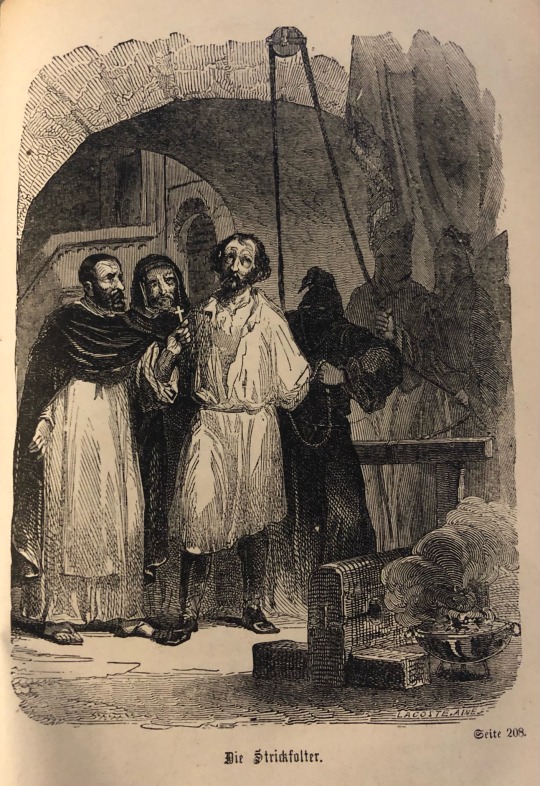
Suppression of the Folk -> Considering the estate-based society, it must be heartrending to think of the discrepancy of the so called God's will and the hypocrisy of the Inquisition- confusing the genuine belief and replacing values with material -> Fear and civilian espionage were the most effective tools of repression, exploiting the blank belief of the majority
"They accustomed the folk to worhsip the materia, the Divine is for them nothing but an altar made of marble and gold."
Other historical facts -> 1484 fanatic monk Thomas de Torquemada started explicit long-term persuits -> The Inquisition in Portugal was established by J. P. de Saavedra and was supported by the Jesuits -> Donkeys were not only helpful for hard fieldwork, those modest and peaceful poor animals were also used to transport the accussed ones to their destination, their ears were cut off, so the hangman can not sell this sadly accursed creature- but also the Spanish King was carried by mules, except on sunday and holidays [also very exciting, how this liason was appreciated in many cultures for their strenght and modesty in one] -> Moorisch-Andalusian culture, actually all bloomings of the Caliphate, were aggressively suppressed - many insults of today are still attacking converted persons (e.g. the knights of La Abencerraje), especially under Deza and Torquemada - many cultural heritages of the Moors were "racked and ruined", but it is still interesting to find hints of the legacy in language and pronunciation -> Lettre de change - an invention of Jewish and Muslim population in the time of the caliphate, emerged as a compromise solution: By sending their financial backup abroad, they prepared their exile and the poor end of the wonderful, up-lifting and productive epoch, in which all three religion worked and lived peacefully together on the Ibererian peninsula
“You, who could just love and praise, why are you tolerating the crimes of those hangmen?” - “To purify the Good”, said a voice next to me.
#literature#book cover#bookworm#The Grand-Inquisitor#darkside of humanity#simony#false-believe#criticism against institutionalised religion#16th century#antiquarian book#history#Spanish culture#catharsis#abuse of power#criticism against church#Roman Empire#old book
2 notes
·
View notes
Text
The Vice President, Yemi Osinbajo addressed journalists and social media practitioners on Friday where he addressed diverse issues.
His office sent a transcript of the interview to PREMIUM TIMES
Excerpt:
Q: On Nigeria’s rating by Transparency International’s Corruption Perception Index.
Vice President: I think that by even Transparency International’s own assessment, Transparency International uses nine different indexes to come to a conclusion. In four out of those indexes, Nigeria moved up, in another four Nigeria stabilised & dropped in only one index. So in aggregation, it (T.I) then decides that it has fallen in certain number of points below where we were.
I think the important thing to bear in mind about Nigeria’s anti-corruption fight is that the government has done what it ought to do by focusing on grand corruption. Grand corruption is the type we experienced years before when, for example, $15 billion was lost in defence contract. Two, three weeks to election, N100 billion in cash was taken out, and again $293 million in cash, two weeks, three weeks to election. That’s the kind of impunity. And of course you are also familiar with the scam that went on in the NNPC at the time; the so called statutory contracts, that’s grand corruption. That is the corruption that crippled the economy of the country.
Let me tell you very quickly how you can recognize that we have scaled a good deal on grand corruption today: despite the fact that we are earning 60 per cent less in revenue, we are actually able to spend more than ever before in the history of this country on infrastructure. In 2017, we spent about N1.3 trillion on capital. That’s the highest in the history of the country. So we are able to do far more with far less because we have controlled the impunity that went on, the grand corruption, and all of that.
Now, how does that translate to perception; because grand corruption is a big aspect of corruption. It’s a big one because if you cannot control grand corruption, you can’t do what you want to do. But then you cannot address the corruption as you go through our airports, our ports or as you go through government offices, in many cases. That’s where the whole perception emerges.
We must have a deeper and much wider way of dealing with corruption. How are you going to do that? You must have an efficient way of doing that; like automation, removing discretion from individuals.
Q: What is the institutionalised process of fighting corruption?
Vice President: Institutionalisation is not a one-off thing, it’s a process, and we are dealing with that, that’s exactly what we are doing. For example, the TSA and being able to look at government accounts and all of that is one way of institutionalising a process by which you can be sure of what people are doing, how this things are happening. The process of allowing the EFCC to do its work without dictation, saying that “look, this what the EFCC is doing”, and giving them every support that you can. These are ways of institutionalising. And it is that same process that we are taking in the public service – Automation.
For example, look at all that we have done in the ease of doing business. The whole point of doing that is institutionalising processes, so that when you come into Nigeria you can get your visa after applying online; so that Customs don’t have to sit around the airport, that is why we are putting in the I-check and we are putting all sorts of other processes. That is to institutionalise; it’s not a one-off process.
Q: What’s the national strategy on anti-corruption?
Vice President: That’s a long conversation, but put simply, the national strategy is to ensure that public officers in particular are not able to privatize public finances. And how do we intend to achieve that? We intend to achieve that by ensuring that there is consequence for corruption and also by automating processes, removing discretion from individuals because if you don’t remove discretion from individuals the individuals can have discretion as whether or not they will grant certain approvals through certain processes; then you continue to encourage corruption at one level or the other.
MAss Burial for Victims of Benue Killings (Photo Credit:
Q: Asides from the EFCC, it seems the other anti-corruption agencies such as the ICPC are doing nothing…
Vice President: Well, I don’t agree. I think that you will find that alongside the work of the EFCC, in fact one of the critical things we do is, we try and re-direct the ICPC. We appointed the executive secretary of the Presidential Anti-Corruption Advisory Council, PACAC, Prof. Bolaji Owasanoye, to head that body and we believe the ICPC is the important part of the whole fight against corruption. We revamped the leadership of the ICPC. Unfortunately we were stalled because it requires Senate confirmation, that hasn’t been done. That is the area of focus for us because the ICPC is supposed to be involved, not just in corruption, but in orientation and re-orientation of the public service. So, it’s an important part of our work.
Q: Nigerians in diaspora are one of the biggest foreign exchange contributors of about $20 billion. Aside from having a Special Adviser to the President on Diaspora Affairs, does Nigeria have a Diaspora partnership?
Vice President: I think we’ve also gone beyond the Office of the Adviser; we now have a Diaspora Commission by law, which I think is a policy step. That Commission will aggregate a lot of the records through data for diaspora in order to encourage the diaspora to interact more with government, with private sector and all that. But don’t forget that, with the whole diaspora experience and what is in tune with other nations of the world; the usual focus is on remittances; what are they able to remit as it is pointed out, it is a substantial amount of money. It is something in the region of $20 billion.
But it obviously goes beyond that. In developing the economy we also need diaspora’s talent. So we need diaspora in technology, we need diaspora in education, medical practice and all that. The Ministry of Health, for example, actively engaged with the personnel in diaspora for specialists, setting equipment and all of that. But I believe that one of the most critical ways of doing so is through the diaspora commission, ordering it, measuring it; once that is constituted.
Q: Allegations of nepotism against the Buhari administration.
Vice President: Look at the cabinet, for example, from the point of view of the religion, it has an equal number – 18 Christians, 18 Muslims; but, we have the Secretary to the Government of the Federation as well as the Head of Service who are Christians. So we have 20 Christians to 18 Muslims; that’s the structure of the cabinet. So if you take that narrative you may argue that perhaps the Christian have the upper hand; that is a possible narrative.
Let us look a little deeper into that, so there are those who may argue, for example, that the north has an upper hand or perhaps one section has an upper hand in the cabinet as one narrative. The South-east, for example, has five states. Four of the South Eastern states have senior ministers; all of them, except one, who is Minister of State for Education.
Nigerian Senate Chamber used to illustrate the story.
Q: The President has no choice in that, it is a constitutional requirement.
Vice President: In assigning particular portfolios he does. In the north, seven northern states have no senior minister, including the President’s home state, Katsina. Now, there are those who will say, if you are nepotistic; surely seven northern states have no senior minister. It’s a narrative depending on how you want to run it.
I give you another example; I’m from the South-west. There are people who will say “I am from the South-west, the North has everything.” The South West, for the first time in the history of this country, has one Minister who is in charge of three ministries: Power, Works and Housing. The Ministers of Finance & Communications are also from the South West. These are critical ministries. You can run the narrative in whichever way that you choose. There are those who will say, for instance, look at the number of CEOs of agencies of government; the highest number of CEOs in our nation today comes from Ogun State, the state has the largest number. There are those who will say that’s his state (i.e VP’S State). So you can run the narrative depending on how you want to run it.
The president has admitted that, yes there are situations where you can find certain things as true and he intends to have a look at that. For example, you’ve given the example of security positions and he said he is going to take a look at look at it. I believe that is the way to go because you can run any narrative that will suit the figures you are showing. And that is where we have legal process. There are people who don’t know that the number of CEOs from Anambra State are more than the number of CEOs from Katsina State or anywhere else, except Ogun.
Q: Revamping Nigeria’s education system.
Vice President: If you will recall about a few months ago, I think it was in January, we had an education retreat; what needs to be done again is to unfold a whole direction in education. We came in with a manifesto on education, we had a few points that we were looking at and we also had some time to look at it. But many of us raised the issue that you don’t just pick the whole education; what about engineering because what we are seeing is such a dramatic change, not just in method of instruction in the requirement, job requirement, employment requirement, in technology and all of that, and that’s exactly what we are trying to do.
For example, we cannot have primary education the way it is, we’ve got to teach young people, we’ve got to introduce technology; you’ve got to have collaboration in education. We discovered, for instance, when we were doing the N-power – employment for young graduates, we discovered that it was also an opportunity to train the graduates. For the first time we were able to open a portal that has educational materials for graduates to just go in there. We also have devices for them to use.
But one important advantage of what we are doing is that all of a sudden, you can now train tens of thousands of people without sitting them in one place. So technology is going to play a role. We are in a very interesting place in terms of education today because you can leverage a great deal on technology. You can leverage a great deal on what is happening in other parts of the world. And we are trying to harness all of those resources and try to do something that will make a difference in our country. Here we are, in another 10 years we will be moving closer and closer to 2050 when we are going to be the 3rd largest population in the world. And there is almost a 70 per cent youth population. We are not going to provide them with the number of classrooms that will be required, so we’ve got to really leverage on technology. We’ve got to leverage on verified trend that we see here and there.
Q: The delay in 2018 budget.
Vice President: We have a democracy that has, as you know, three arms. The two relevant arms for budget are the executive and legislature. If you recall when I was Acting President, I signed the 2017 budget and, at that time, I made the announcement with the full consensus of the National Assembly that, from 2018, we are going to have a budget that is going to apply in January and end in December the normal financial year. We agreed that we will submit our proposal in good time, and we did that first week of November. The president did so. We fulfilled that part of the agreement. The budget is with the National Assembly. There is very little we can do to control that. That’s the system that we have.
Q: Seeming rift between the Executive arm of Government and the Legislature.
Vice President: Well, I’m not so sure that the tensions are unknown. The democratic system anywhere as, for example, in the U.S. where we borrow our bicameral legislature from, you find that despite the fact that the Republican Party controls major part of parliament, it still doesn’t mean that bills are necessary going to go through.
So one must assume that the responsibility of the National Assembly is to scrutinise what the executive is doing and not just to be a rubber stamp. But I also agree with you entirely that it’s important for us, for the sake of our country, our economy and for the sake of many young people who are relying on us to deliver. We ensured that we released our budget on time. I want to believe that the executive has done its part and we wait on the National Assembly.
Q: About N9 Trillion debt said to have been inherited by this administration now reportedly about N30 T. How come?
Vice President: No, No, I don’t think so. First let me explain that we have a government that is very prudent, a government that believes in financial prudence, a government that condemns impunity – the way that the thing was practiced before now, and a government that spends resources on the right thing. For the first time in the history of our country, we are spending about N1.3 trillion on capital; it means that we are investing in the right place. We are not just borrowing money anyhow; no, we are investing in the right place.
Every government or most governments anywhere probably look for some points to borrow, but the important thing is what are you borrowing for? And that’s why we building the Lagos-Kano rail, doing the Lagos-Calabar rail, the second Niger Bridge and the Mambilla hydro project that has been abandoned for almost 40 years.
We are improving capacities in power, we are investing in social investment, we are investing long-term in the things that will create an economy that can support a large number of young graduates, who are coming in the market every day. That’s a process that needs a lot of thinking; that needs a lot of investment.
I think the most important thing is to ask that when there was a N9 trillion debt, where is the infrastructure to account for that? I think that is the most important question to ask. It’s not whether you borrow, but what you spend that money on. I think we should be able to prove that the earning is 60 per cent less than the earning in the past five six years. So we are spending far more on the right thing and we are able to ensure that we build a future that young people can truly look forward to.
Q: What about the 50 per cent revenue reportedly being spent on settling debts?
Vice President: No, we are not spending 50 per cent of our revenue servicing debt. Let me explain that, we have a deficit somehow in the region of about N2.6 trillion now, a lot of our revenue has to be spent on capital and recurrent, and recurrent is 70 per cent of revenue. But for the first time we are spending 30 per cent on capital. Before now when oil was a $115 a barrel, we were spending 11% or 15% on capital, and capital is the most important expenditure because that is where you do the infrastructure in order to be able to build the economy. So the reality is what we are spending is to provide the infrastructure that will last.
Q: Abduction of 110 Dapchi girls in Yobe and the killings in states like Benue and Zamfara. Why didn’t the President or you visit these places?
Vice President: Let me say it first that no amount of condolence can compensate for the loss of life, whether in Calabar, Mambilla or Benue or where people were killed in Adamawa or Zamfara, any of these states. There is no amount of condolence that can compensate for the loss of life. Benue killing is one set of killing far too much; there is no amount of condolence that can compensate for that. And I want to say that it’s a massive tragedy. But the question that you seem to ask I’ve been to Zamfara, I’ve been to Adamawa when this killing took place. There are those who said, ‘oh, why don’t you visit the Fulani settlement, why do visit only where Christians were?’ I even visited Benue in September where there have been killing before; then I’ve visited them when the flooding took place and we looked at all the issues and tried to address many of these. There have been several of these issues in different places, recently Dapchi. We have expressed condolences, but no amount of condolence would do.
The more important thing, and our focus has been, is first of all ensuring security in these places.
EFCC Operatives
We have to address the security question in a much more robust way; that the police are able to do these effectively. We have deployed the military to Kaduna, two battalions to Kaduna. In Benue and Taraba axis, we have the 93 battalion, we have 72 Special Forces. We have full concentration in Taraba and all of that, and by the way, the military is fighting in most of the North East. So there is a situation where the military is overstretched. So I think the most important thing is first of all to ensure they actually address the security of the people.
Q: Nigerians definitely appreciate all you are doing. But they want to see their leaders come to them to grieve with them in the face of national human tragedy…
Vice President: Let me say that I definitely agree with you, the more places that we can go to the better. But I made a point earlier that we also have to address the serious concern that people have. We have to address those concerns; we have to address the rehabilitation concern. I am going round and the President is also going round, there is no question at all and I agree that if we go to all these places it would be so much better.
INTERVIEW: If I, President Buhari visited Dapchi, Benue, others, “it would be so much better” – Osinbajo The Vice President, Yemi Osinbajo addressed journalists and social media practitioners on Friday where he addressed diverse issues.
#Benue killings#Dapchi girls#News#Nigerian news#PREMIUM TIMES#premium times news#President Muhammadu Buhari#Vice President Yemi Osinbajo
0 notes
Text
With this slur against Africans, Macron’s radical pretence is over | Eliza Anyangwe
The president is rebuffing Frances colonial responsibilities, says Eliza Anyangwe, a writer specialising in Africa issues
Frances newly elected president, Emmanuel Macron, when asked in a press conference at the G20 summit in Hamburg why there was no Marshall plan for Africa, has pointed out that Africa had civilisational difficulties . He added that part of current challenges facing the continent was the two countries that still have seven to eight children per woman.
The condemnation online was speedy and relentless. The US political scientist Laura Seay summarised their own problems numerous had with Macrons messages in a series of tweets: It is RICH for a French president to criticise Africa this mode, she said. Frances colonial assumption was called the mission civilisatrice, which alleged to fetch all the benefits of Frenchness to the continent. Part of the mission was the institutionalisation of Catholicism as government officials religion of French colonial fields in Africa.
We learn all kinds of effects of the mission civilisatrice in Francophone Africa today, she prolonged, like the churchs schooling against contraceptive help, which most African adherents take very seriously. Do women in Francophone Africa want to give birth to far more children than they can reasonably feed, invest, and educate? I disbelieve most do.
Macrons terms had commentators wished to know whether the honeymoon was now over as a chink was incorporated in the Golden Boys armour, but perhaps the signs were there all along. While still campaigning for the presidency, Macron called Frances colonial record in Algeria a crime against humanity. But this centrist politician rapidly changed his sentiment when his castigation of Frances merciless past was met with criticism at home. In a communication in the south-eastern metropoli of Toulon, Macron apologised for having hurt voters fondness, and dumbed down his accusation to speak instead of the need for France to face its complex past. But what about the sensibilities of the millions of Africans you casually slur, Monsieur Macron?
It seems that despite his youth and vitality, the brand-new chairwoman is sticking to a very old line when it comes to Frances position on Africa. Take Nicolas Sarkozy, who on a visit to Dakar, in Senegal, in 2007 said that the tragedy of Africa is that the African has not fully entered into biography … They have never genuinely launched themselves into the future. The African peasant only knew the everlasting rehabilitation of occasion, differentiated by the endless redundancy of the same gestures and the same words. Delivered with the poem you would expect from a Frenchman, erroneous and insolent as blaze but likewise plain age-old racist. I would say that, in huge constituent, Africans havent entered into record because Europeans preserve writing them out of it. But thats for another day.
Many will decry the comparison to the harder-right Sarkozy. And conceded, Macrons full reply in Hamburg, while jogging and hamfisted, is not too disparate from what a classical developing economist might say: stable government, corruption, person thunder as financial burden. But for a captain whose referendum succes was imbued with the promise of radical change, announcing like new developments economist is precisely the problem.
Macrons announcements form the blood boil not because they are novel but since they are acquire no mention of the root causes of the challenges of which the president pronounces. Gone is the lucid, welcome admission that Frances role in its former colonies was anything but laudable. He now says good-for-nothing of the fact that Frances future is indelibly tied to that of its former settlements, and that the relationship between the two remained largely neocolonial: Francophone Africa still trades heavily with France, and French companionships particularly in the extractive industries have a strong existence on the continent.
More controversially, Frances tie-in with its former settlements known as Franafrique is perhaps excellent captured by the use of the CFA franc currency, which offers little benefit to the Francophone people. As the Cameroonian journalist Julie Owono has written :~ ATAGEND CFA zone countries have to deposit 50% of their money modesties into a so-called operations account administered by the French fund.
Militarily, France also continues to mire itself in issues of state in its former settlements, but is often silent on human and civil rights abuses. Again, look at Cameroon, where the strongman Paul Biya imprisons rivals with no charge, congregates peaceful protest with brutality, and diverts off the internet in order to stillness his beings all of which has elicited not a peep from the French regime.
The test of Macrons presidency is his foreign policy, particularly on Africa. At the moment hes doing a fine profession of proving “he il be” slashed from the same cloth as every governor who has come before him: adopting a paternalistic feeling and delighted to be able to moralise, while advantaging from the carnage France facilitated form to which, at best, he makes a blind eye.
Read more: www.theguardian.com
The post With this slur against Africans, Macron’s radical pretence is over | Eliza Anyangwe appeared first on vitalmindandbody.com.
from WordPress http://ift.tt/2hxG0of via IFTTT
0 notes
Note
Thanks so much for taking the time to answer!! I asked this because I am a Jewish student and I have real concerns about the institutionalised anti semitism in the Labour party in recent years. A lot of people say that labour isnt racist because they don't acknowledge anti semitism as racism and i feel that is part of the problem. I am against everything the torries stand for and ideology wise i would probably be more labour, but the anti semitism really worries me. And of course theres a..
No need to say thank you! I always enjoy looking at different view points, especially as a minority myself who knows parties are a really difficult thing to handle. I hope you don’t mind that I’m going to copy and paste your others asks below as I know they continue from one another as you said! So to my followers who are following this conversation, this next paragraph in italics continues from this particular anon ask, and was asked by the anon separately due to the ask box word count limitation!
…difference between the criticism of israel and anti semitism; one is a political stance and one is just pure racism, but a lot of anti israel criticism stems from deep rooted anti semitism. And while i agree that a few anti semites dont define the party, i still worry about how often these things tend to happen in it. As a whole, the Jewish community is quite liberal; the more religious groups might be more conservative but that a different thing, which is why it is so hard today for us. So since I personally don’t have day to day contact with people outside my community i wanted to ask what other people thought. Because, if we take the us, trump has been admittedly more vulgar, but he is being crucified for being islamophobic while labour leaders seem to keep getting away with anti semitism (in no way am I defending trump - he is a biggot that never shouldve been elected). One last thing - i feel that people think that because labour are not generally racist against skin colour people dont take the anti semitic claims seriously. Sorry for the long messages x By the way if you mind me asking, were abouts in the UK are you from?
Firstly, I agree that anti Israel sentiments can be due to deeply rooted anti-semitism - just as often stereotypes can be intrinsically rooted in racist ideals. But I feel we also have to understand that, as you said, while a lot of these criticisms come from discriminative backgrounds, there is also some criticisms that are not just politically based, but humanity based. I feel Corbyn in this instance (I am excluding Livingstone because he is an all out anti-Semitic in my book) has the well-being of Palestinians well and truly within his mind - but ofc I cannot prove that. He counter acts Israel not because of the Jewish community, but because of the atrocities taking place under their watch (with help from others of course). I know I keep trying to defend myself with the ‘but I don’t know what he really means’, but that’s because I truly don’t. I don’t know the inner workings of his mind - and he doesn’t help himself by not being more specific in order for us to understand. I also feel like I’m putting words in his mouth so forgive me for that, but this is what I think is the case (I could be completely wrong).
I think I understand what you mean in terms of the liberal but religiously conservative ideals. I guess for me as an Indian girl I think my community is more conservative in all aspects (except the generation which I am a part of). I would argue however with your argument about Trump, that his attacks have been much more individualistic based (on his personality and what he says) rather than Republicans (as of late) while I feel the anti-Semitism is more on the Labour party as a whole. I also feel Trump has been much more engaged with such discrimination within his policy making (i.e. the Travel Ban) while Labour have not done anything to insight such anti-Semitism within their policy - not to say the institution is not flawed. I think attacking an individual compared to an institution are very different things - and I don’t believe in this ‘one person to represent the many’ sometimes because we’re all just so bloody different surely that would be difficult? I mean that’s the point of having other people behind a leader - to also steer them and give them different view points. I also put in bold one thing you said, and I hope other people who see this also can give their two cents that way you get more views! It is worrying like you said it happens really often, but I do think as well there is a rhetoric of anti-Israel rather than the Jewish community in Labour’s current state, but of course you may view that different from your position which is completely fair! But I guess that is also a worrying case as well!
In concerns with your second to last point on skin colour being seen as racist but anti semitism not being taken seriously, I shouted in my house ‘helllll yeahhhhhhhh’ because you are so right! Discrimination is only thought of within two spades of the mainstream thought - sexism and racism. We know however, there is much more to this, religion, disability, sexuality, age etc. The list goes on - and while I feel sexuality is taken more seriously these days, I feel like religion still isn’t. Yes islamophobia is a hot topic (rightly so), but there are other religions too which face discrimination.
I actually asked my Jewish friend this question in a different way, as she is British and voted within this election. She practices Judaism almost to a T - she has such a huge love for her religion (she is a very active member of the Jewish society at my University). I know for a fact she voted Labour, and I asked why (like u asked me anon) the anti-Semitism behind the party and it’s history did not effect her vote and she said this:
Oh! Well I chose it because I always have! They still have a lot of the things I want in a leadership […] I believe in him [Corbyn] tbh. May is just going to allow more hate into this country with the way she is […] I think Jeremy is an individual against his whole party. Remember he was was in such a low point last year, where everyone was basically conspiring against him? It made me remember that parties are meant to be one entity but they really aren’t - there are so many individuals a part of that one party - like a community. But they are all individuals who have slightly different values but i guess with Corbyn he had some ideas really different to the rest of them for them to collapse so much […] Thing is yes he doesn’t speak for me as a Jewish girl, but he does speak for me as a student living in a country which is gonna get into some deep stuff soon, and I know as a student about to graduate he will speak for me. That’s why I voted him.
I think she makes a really good point - basically saying we are all different people within one person. We all have different identities - like I’m a brown, Indian girl who is the child of two expelled migrants. But I am also a really British student who loves geography and wants to work in media. My friend just happens to take into concern one half of herself more than the other with this vote - she’s voting for her future. I also think the party’s Jewish members would not stand for this if the party was so intrinsically encased with anti-Semitism - or would definitely call it out at least. It is like you said, worrying that it is happening so much and I just hope those Jewish members if they get their seats are strong enough to call those attitudes out of the party. I don’t know - maybe I just sound really in denial to you and I’m sorry for that!
Sorry that went off topic slightly but I felt her view point was just as important as mine.
And regarding your last question, I won’t say where I’m currently based in the UK but I did my postal vote in regards to my ‘home’ borough in London. Also sorry if I’m not making sense! It’s 1:30am rn and I’m sooooo tired but I’ll make sure to look at this properly when I wake up and make sure I have answered all your questions!! Also don’t apologise for the long questions!
0 notes
Text
THE MISUSE OF CULTURAL RELATIVISM MANIFESTO
Culture is fundamental to a person’s identity. It influences desires, fears and values. Therefore, culture will always be involved when discussing or trying to understand identity. Being aware of these differences prevents cultural insensitivity between people of different backgrounds. This humane concept has, however, been taken too far. Movements such as Political Correctness have led to an anxious sensitivity that prevents the freedom to criticise cultures where the critic is an outsider. This is because the values of for example South Africa are relative to that culture.
It is due to this that I believe that cultures should be criticised when they go against universal human rights.
How could I begin to excuse acts that permit Oppression, Torture and Child Mutilation? Whilst this does not mean cultures should not be respected, blatant disregard for Human Rights should never be excused because there is a difference between cultural prejudice and impeaching acts that are atrocious abuses of those rights.
FGM or female genital mutilation is the practice of deliberately changing, cutting or injuring female genitals before puberty for no beneficial medical reason. Aside from it being traumatic as anaesthetics and antiseptics are not often used, it can lead to incontinence, Toxic Shock Syndrome, infertility, constant pain, difficulty enjoying sex, mental health problems and life-threatening problems during childbirth.
It is carried out as a preparation to marriage, religion or social norm if the female members of her family have had FGM done to them as well.
FGM is illegal in the UK and so often girls are taken abroad to parts of Africa, the Middle East and Asia, often over summer break as that allows them more time to ‘heal’.
That is Inexcusable.
This is not to say that only destitute cultures are to be criticised either. It is blind and naïve to think that only non-westernised cultures are flawed. Even in recent events in First-World countries, debates turned violent in the debacle of ‘Black Lives Matter’ versus ‘All Lives Matter‘ where something as simple as changing one word in a chant speaks so much of the condition of race relations in America.
Slavery was abolished in 1863. It has been 154 years. So how did it get to this point?
The point where black lives STILL must fight tooth and nail for the right to matter just as much as white lives. But the 44th president was African-American and only black people can say the ‘n word’.
What racism?
All Lives don’t matter, because if they did institutionalised form of racism would not lead to so many innocent lives being taken without their killers being rightly prosecuted. And the justified backlash against this would not be seen as unnecessary or exaggerated.
Don’t let your fear of being tagged as a racist keep you from speaking up
What you call a risk could be called humanitarianism
It’s not about pushing your culture as the superior one,
It’s about realizing that some actions are not excusable,
It’s about realizing that speaking out is not a choice
But a responsibility
It’s about being passionate
Not ignorant
Choose a universal moral truth anxious sensitivity
Choose human rights over cultural relativism
What will you do?
0 notes
Text
With this insinuation against Africans, Macron’s revolutionary pretence is over | Eliza Anyangwe
The president is rebuffing Frances colonial responsibilities, announces Eliza Anyangwe, a columnist specialized in Africa issues
Frances newly elected president, Emmanuel Macron, when asked in a news conference at the G20 summit in Hamburg why there was no Marshall plan for Africa, explained that Africa had civilisational troubles . He added that part of the challenge facing the continent was the countries that still have seven to eight children per woman.
The condemnation online was speedy and relentless. The US political scientist Laura Seay summarised their own problems many had with Macrons texts in a series of tweets: It is RICH for a French chairwoman to criticise Africa this acces, she told. Frances colonial hypothesi was called the mission civilisatrice, which purported to accompanied all the benefits of Frenchness to the continent. Part of members of the mission was the institutionalisation of Catholicism as the official religion of French colonial provinces in Africa.
We interpret all kinds of effects of members of the mission civilisatrice in Francophone Africa today, she prolonged, like the churchs educating against contraceptive employment, which most African adherents take very seriously. Do women around Francophone Africa want to give birth to much more children than they can reasonably feed, robe, and educate? I disbelieve most do.
Macrons terms had commentators asking whether the honeymoon was now over as a chink is contained in the Golden Boys armour, but perhaps the signs were there all along. While still campaigning for the conference of presidents, Macron called Frances colonial biography in Algeria a crime against humanity. But this centrist politician instantly changed his judgment when his chide of Frances merciless past was met with analysi at home. In a addres in the south-eastern municipality of Toulon, Macron apologised for having hurt voters notions, and dumbed down his accusation to speak instead of the is necessary to France to face its complex past. But what about the sorrows of the millions of Africans you casually slur, Monsieur Macron?
It is felt that despite his youth and vitality, the new president is sticking to a very old line when it comes to Frances position on Africa. Take Nicolas Sarkozy, who on a visit to Dakar, in Senegal, in 2007 “re just saying that” the tragedy of Africa is that the African has not fully entered into record … They have never really propelled themselves into the future. The African boor only knew the everlasting renewal of duration, celebrated by the endless duplication of the same gesticulates and the same paroles. Extradited with the poetry you would expect from a Frenchman, erroneous and snobbish as blaze but likewise plain old-time prejudiced. I would say that, in huge component, Africans havent entered into biography because Europeans keep writing them out of it. But thats for another day.
Many will criticize the comparison to the harder-right Sarkozy. And awarded, Macrons full reply in Hamburg, while rambling and hamfisted, is not extremely dissimilar from what a classical development economist might do: stable authority, corruption, person thunder as financial headache. But for a ruler whose ballot victory was steeped with the promise of radical change, reverberating like new developments economist is precisely the problem.
Macrons accounts reach the blood simmer not because they are novel but since they are construct no mention of the root causes of the challenges of which the president communicates. Gone is the lucid, welcome admission that Frances role in its former colonies was anything but laudable. He now answers nothing given the fact that Frances future is indelibly tied to that of its former settlements, and that the relationship between the two remains largely neocolonial: Francophone Africa still trades heavily with France, and French corporations particularly in the extractive industries have a strong attendance on the continent.
More controversially, Frances relationship with its former colonies known as Franafrique is perhaps good captured by the use of the CFA franc currency, which offers little benefit to the Francophone societies. As the Cameroonian journalist Julie Owono has written :~ ATAGEND CFA zone countries have to situate 50% of their currency reservations into a so-called activities account managed by the French fund.
Militarily, France too continues to mire itself in issues of state in its former settlements, but is often silent on human and civil rights abuses. Again, look at Cameroon, where the strongman Paul Biya imprisons resists with no charge, fills peaceful protest with violence, and swerves off the internet in order to better stillness his beings all of which has derived not a peep from the French regime.
The test of Macrons presidency is his foreign policy, particularly on Africa. At the moment hes doing a fine job of demonstrating “he il be” piece from the same cloth as every leader who has come before him: accepting a paternalistic manner and delighted to be able to moralise, while advantaging from the carnage France facilitated form to which, at best, he changes a blind eye.
Read more: www.theguardian.com
The post With this insinuation against Africans, Macron’s revolutionary pretence is over | Eliza Anyangwe appeared first on vitalmindandbody.com.
from WordPress http://ift.tt/2iDTDVQ via IFTTT
0 notes
Text
Will Ram Rahim's imprisonment bring to an end the godman syndrome in India?
Godmen, even the fake ones, know what the sacred texts say - ‘You reap what you sow’. Dera Sacha Sauda chief, who goes by the name of Gurmeet Ram Rahim Singh— a farcical attempt to symbolise communal togetherness — has been convicted by a CBI court for rape and sentenced to 10 years of rigorous imprisonment. It’s taken 15 years for justice to come, but as a popular line in Hindi films goes, “Kanoon ke hath bahut lambey hain” (the hands of the law are longer). Still, many would say that it’s too little as a punishment for a repeated crime of such heinous nature; he ought to have been given a life term.
The phenomenon of fake godmen did not begin with this baba nor will it will end with him.
×
Baba Gurmeet Ram Rahim Singh is one among the many discredited so-called godmen the Indian society has grappled with and will continue to do so. This is because the phenomenon of fake godmen did not begin with this baba nor will it will end with him. But, how is it that a society which has been enlightened spiritually and shown the path to true devotion from the likes of Ramakrishna Paramhansa and Ramanna Maharishi and Swami Vivekananda, from saints such as Tukaram and Namdev and Hazrat Nizamuddin, to Sri Aurobindo and J Krishnamurthy, and from devotees like Mirabai, should fall into the clutches of the likes of Gurmeet Ram Rahim Singh and Asaram Bapu and Nityananda — and preachers of the Zakir Naik kind?
Make no mistake, the Dera Sacha Sauda movement is not going to disappear with its leader secured behind bars. Asaram Bapu’s devotees are still out there in thousands across the country. Give these devotees all the evidence against their revered spiritual leader — even evidence of rape — but they will just refuse to buy it. They will see conspiracies behind the actions against their babas and swamis and will come out on the streets in violent protest. What makes the forgery tick and why?
Today’s devotee seeks instant nirvana and is attracted by glamorous displays of the path to salvation.
×
One reason is the mindset of contemporary society. Today’s devotee seeks instant nirvana and is attracted by glamorous displays of the path to salvation. It has no patience with the ascetic withdrawn from daily life, who lays down a long and difficult road to enlightenment. Such a follower sees nothing aberrant in a godman acting in films, dressing in a hilarious manner, and indulging in politics and immorality.
Of course, this is not enough for a godman to win over lakhs of supporters. He spins off various charitable activities, such as free schools and hospital to attract crowds and devotees. Some of them, such as the Dera chief, appeal to the conscience of marginalised sections of society who have been disappointed by the mainstream religious order and offer them an alternative. Once his charitable empire grows, so does his religious/spiritual domination. Soon, he begins to attract the attention of politicians who are ever on the prowl for vote-banks. That is how Gurmeet Ram Rahim Singh grew in stature. And, this is the reason why Haryana Government dealt with the brewing crisis prior to his conviction with kid gloves.
It has been reported that the Dera chief had extended his support to the BJP during the last Assembly election in the State. He has also hobnobbed with senior Congress leaders. Similar was the case with Zakir Naik. His social activities and religious appeal led to many senior members of the Congress allowing him a free run while he spewed communal venom during the UPA rule. Thus, the religion-social work-political support nexus can make an imposter into a self-styled godman.
The religion-social work-political support nexus can make an imposter into a self-styled godman.
×
Today’s godmen don’t appear to trust God to protect them - they have their own private armies.
Three years ago, another one of this tribe, Sant Rampal of Haryana, had sought to cock a snook at the law of the land when the police had to move in to nab him. His private army, equipped to fight, kept vigil over his ashram in Hissar and robustly resisted the police.
Baba Gurmeet Ram Rahim Singh’s supporters were armed with petrol bombs and other such implements. It may be recalled that a year ago, so-called spiritual leader Ramvriksh Yadav, who claimed to be a follower of Netaji Subhas Chandra Bose, had, along with supporters, occupied a public park and turned it into his sect’s headquarters. It was doubtlessly done with the connivance of the some of the State’s then ruling party leaders. When the administration was compelled to act against Yadav on court orders, mayhem resulted. The so-called spiritual leader’s private army swung into action, leading to serious violence. There are those who believe that religion and spirituality shun violence, but sects run by the likes of Yadav and Baba Gurmeet Ram Rahim Singh certainly do not.
A journalist who had written a critical report on the Dera’s functioning and its leader’s notorious reputation, lost his life.
×
It can be argued that a majority of the followers of controversial godmen are naive, and they genuinely believe in the goodness of their leader. They have no opportunity to run away from this belief because that ‘goodness’ is amplified many times over through sustained propaganda — when this does not work in certain cases, other, strong-arm methods are covertly applied. Critics of such leaders are known to have disappeared or died in suspicious circumstances. It happened in Sathya Sai Baba’s case, and it happened in Baba Gurmeet Ram Rahim’s case either — a journalist, who had written a critical report on the Dera’s functioning and its leader’s notorious reputation, lost his life.
The rising stock of fake godmen in Indian society has also to do with the sense of dissatisfaction and mental unrest that has come with materialism and consumerism. It can be argued that both these reasons prevail in Western society too, and perhaps in a more acute form, and yet the dubious godmen phenomenon is more strongly rooted in India. This is true, but there are two differences. The first is that the Indian mind, evolved through generations of a particular cultural ethos which seeks to place spiritualism on a higher pedestal than materialism, gets easily rebellious and is more susceptible to be drawn towards a spiritual/religious calling — even if it is to be satiated by questionable quarters.
The second reason has to do with the flexibility of Hinduism — the country’s majority religion. This flexibility has indeed been Hinduism’s strength, preventing it from becoming rigid, unchanging and exclusive. It has allowed the prosperity of other religions too, some new and others that spun off from Hinduism itself and evolved as independent entities. There has been no central institutionalised authority to guide the affairs of an ordinary Hindu. But this commendable feature also allowed space to all sorts of dubious elements to project themselves as spiritual or religious leaders, or even incarnations of God, who had the mandate to do anything.
And yet, despite the bleak present, there is hope for future through the exposure of the likes of Gurmeet Ram Rahim Singh. Indian society ought to be rattled enough to abandon the lure of false godmen and delve into the life and works of the country’s great spiritual leaders, such as the icons of the Bhakti movement, for a meaningful life.
]]>
0 notes
Text
No God protected him, Ram Rahim jailed for 10 years
Godmen, even the fake ones, know what the sacred texts say - ‘You reap what you sow’. Dera Sacha Sauda chief, who goes by the name of Gurmeet Ram Rahim Singh— a farcical attempt to symbolise communal togetherness — has been convicted by a CBI court for rape and sentenced to 10 years of rigorous imprisonment. It’s taken 15 years for justice to come, but as a popular line in Hindi films goes, “Kanoon ke hath bahut lambey hain” (the hands of the law are longer). Still, many would say that it’s too little as a punishment for a repeated crime of such heinous nature; he ought to have been given a life term.
The phenomenon of fake godmen did not begin with this baba nor will it will end with him.
×
Baba Gurmeet Ram Rahim Singh is one among the many discredited so-called godmen the Indian society has grappled with and will continue to do so. This is because the phenomenon of fake godmen did not begin with this baba nor will it will end with him. But, how is it that a society which has been enlightened spiritually and shown the path to true devotion from the likes of Ramakrishna Paramhansa and Ramanna Maharishi and Swami Vivekananda, from saints such as Tukaram and Namdev and Hazrat Nizamuddin, to Sri Aurobindo and J Krishnamurthy, and from devotees like Mirabai, should fall into the clutches of the likes of Gurmeet Ram Rahim Singh and Asaram Bapu and Nityananda — and preachers of the Zakir Naik kind?
Make no mistake, the Dera Sacha Sauda movement is not going to disappear with its leader secured behind bars. Asaram Bapu’s devotees are still out there in thousands across the country. Give these devotees all the evidence against their revered spiritual leader — even evidence of rape — but they will just refuse to buy it. They will see conspiracies behind the actions against their babas and swamis and will come out on the streets in violent protest. What makes the forgery tick and why?
Today’s devotee seeks instant nirvana and is attracted by glamorous displays of the path to salvation.
×
One reason is the mindset of contemporary society. Today’s devotee seeks instant nirvana and is attracted by glamorous displays of the path to salvation. It has no patience with the ascetic withdrawn from daily life, who lays down a long and difficult road to enlightenment. Such a follower sees nothing aberrant in a godman acting in films, dressing in a hilarious manner, and indulging in politics and immorality.
Of course, this is not enough for a godman to win over lakhs of supporters. He spins off various charitable activities, such as free schools and hospital to attract crowds and devotees. Some of them, such as the Dera chief, appeal to the conscience of marginalised sections of society who have been disappointed by the mainstream religious order and offer them an alternative. Once his charitable empire grows, so does his religious/spiritual domination. Soon, he begins to attract the attention of politicians who are ever on the prowl for vote-banks. That is how Gurmeet Ram Rahim Singh grew in stature. And, this is the reason why Haryana Government dealt with the brewing crisis prior to his conviction with kid gloves.
It has been reported that the Dera chief had extended his support to the BJP during the last Assembly election in the State. He has also hobnobbed with senior Congress leaders. Similar was the case with Zakir Naik. His social activities and religious appeal led to many senior members of the Congress allowing him a free run while he spewed communal venom during the UPA rule. Thus, the religion-social work-political support nexus can make an imposter into a self-styled godman.
The religion-social work-political support nexus can make an imposter into a self-styled godman.
×
Today’s godmen don’t appear to trust God to protect them - they have their own private armies.
Three years ago, another one of this tribe, Sant Rampal of Haryana, had sought to cock a snook at the law of the land when the police had to move in to nab him. His private army, equipped to fight, kept vigil over his ashram in Hissar and robustly resisted the police.
Baba Gurmeet Ram Rahim Singh’s supporters were armed with petrol bombs and other such implements. It may be recalled that a year ago, so-called spiritual leader Ramvriksh Yadav, who claimed to be a follower of Netaji Subhas Chandra Bose, had, along with supporters, occupied a public park and turned it into his sect’s headquarters. It was doubtlessly done with the connivance of the some of the State’s then ruling party leaders. When the administration was compelled to act against Yadav on court orders, mayhem resulted. The so-called spiritual leader’s private army swung into action, leading to serious violence. There are those who believe that religion and spirituality shun violence, but sects run by the likes of Yadav and Baba Gurmeet Ram Rahim Singh certainly do not.
A journalist who had written a critical report on the Dera’s functioning and its leader’s notorious reputation, lost his life.
×
It can be argued that a majority of the followers of controversial godmen are naive, and they genuinely believe in the goodness of their leader. They have no opportunity to run away from this belief because that ‘goodness’ is amplified many times over through sustained propaganda — when this does not work in certain cases, other, strong-arm methods are covertly applied. Critics of such leaders are known to have disappeared or died in suspicious circumstances. It happened in Sathya Sai Baba’s case, and it happened in Baba Gurmeet Ram Rahim’s case either — a journalist, who had written a critical report on the Dera’s functioning and its leader’s notorious reputation, lost his life.
The rising stock of fake godmen in Indian society has also to do with the sense of dissatisfaction and mental unrest that has come with materialism and consumerism. It can be argued that both these reasons prevail in Western society too, and perhaps in a more acute form, and yet the dubious godmen phenomenon is more strongly rooted in India. This is true, but there are two differences. The first is that the Indian mind, evolved through generations of a particular cultural ethos which seeks to place spiritualism on a higher pedestal than materialism, gets easily rebellious and is more susceptible to be drawn towards a spiritual/religious calling — even if it is to be satiated by questionable quarters.
The second reason has to do with the flexibility of Hinduism — the country’s majority religion. This flexibility has indeed been Hinduism’s strength, preventing it from becoming rigid, unchanging and exclusive. It has allowed the prosperity of other religions too, some new and others that spun off from Hinduism itself and evolved as independent entities. There has been no central institutionalised authority to guide the affairs of an ordinary Hindu. But this commendable feature also allowed space to all sorts of dubious elements to project themselves as spiritual or religious leaders, or even incarnations of God, who had the mandate to do anything.
And yet, despite the bleak present, there is hope for future through the exposure of the likes of Gurmeet Ram Rahim Singh. Indian society ought to be rattled enough to abandon the lure of false godmen and delve into the life and works of the country’s great spiritual leaders, such as the icons of the Bhakti movement, for a meaningful life.
]]>
0 notes